Faye Fite's Blog, page 26
May 13, 2016
6 Tips for Writing an Imposing and Complex Villain
You want to know something weird? I've had this blog for almost two years and I've never written a post about villains. Why? I have absolutely no idea. It is a problem I will fix today.
Villains are more than just obstacles for your hero to overcome. They are characters who deserve just as much attention as the heroes. Why? Because without a villain, your book would have little to no tension. Chances are, your book wouldn't even need a hero. So don't ignore your bad guy. We all know that that ends with you getting cursed with eternal sleep on your birthday. Not fun.
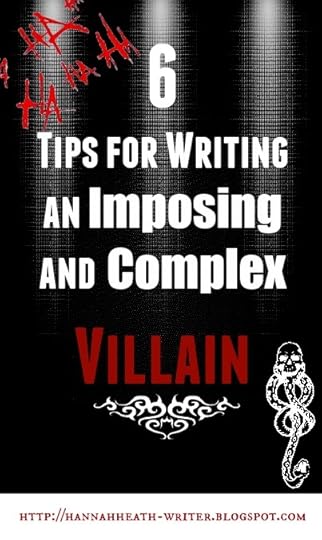 1. Give your villain a personality. Before you do anything with your villain, sit down and get to know him/her. What's his favorite color? Does he have a sense of humor? What does he like to do when he's not burning down villages? What is his backstory? I've said this in almost all of my 'how-to-write-characters' posts, but I'm going to keep saying it until people catch on: Your character should be a person first, and then a character with a specific role. If you do not do this, your character will be as flat as Voldemort's nose. You do not want this. So, to recap: your villain needs to be a person before she can be a bad person. Got it? Okay. Good.
1. Give your villain a personality. Before you do anything with your villain, sit down and get to know him/her. What's his favorite color? Does he have a sense of humor? What does he like to do when he's not burning down villages? What is his backstory? I've said this in almost all of my 'how-to-write-characters' posts, but I'm going to keep saying it until people catch on: Your character should be a person first, and then a character with a specific role. If you do not do this, your character will be as flat as Voldemort's nose. You do not want this. So, to recap: your villain needs to be a person before she can be a bad person. Got it? Okay. Good.
2. Give your villain motivation. Why is your villain doing all of these bad things? Generally speaking, "Because he's evil" isn't a super great answer if you want to create a complex bad guy. Your villain needs a reason. Most kids don't have "Villain" in mind as their answer to "What do you want to be when you grow up?" Think about what made your character fall. Perhaps your villain was a decent person, but was thrust into power and is now too afraid of loosing said power that she's willing to do whatever it takes to keep it. Maybe he's protecting somebody (or somebodies). Or here's a scary idea: Maybe he thinks he's in the right. Oh, here's a good one: Maybe somebody broke her heart and now she's going to spend the rest of her life brewing in hatred. Yeah. That's a great one! Everyone should use it. Clearly, bad breakups make women start murdering people while wearing black leather and low-cut dresses.
3. Give them rules to live by, no matter how small. There's nothing more interesting than a villain with morals, even if those morals are very skewed. President Snow has no problem slaughtering innocents, but he is not wasteful and will not kill without what he sees as a good reason. Loki is willing to lie and cheat and toy with people, but he doesn't want any of his family members to die. Bellatrix Lestrange may be completely insane, but nothing will make her betray her loyalty to You Know Who. While extremely messed up, The Joker does have a very thin set of rules, that being that he believes everyone to be crazy deep down and thus will not bow to worthless societal rules.
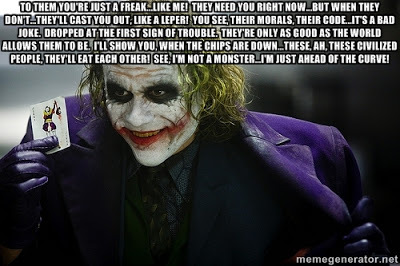 So find out where your villain draws the line. Everybody has one. In the case of villains, they're just extremely skewed and often not what non-villains would recognize as morality.
So find out where your villain draws the line. Everybody has one. In the case of villains, they're just extremely skewed and often not what non-villains would recognize as morality.
4. Connect your villain to your hero. "No, I am your father!" This is the epitome of villain creation: Make your villain similar to your hero. Give them a similar background, a similar personal struggle, or even a similar goal. This can raise the tension in the story quickly while also making your readers sympathize with both the hero and villain. It can also lead to a lot of interesting question. Harry and Tom Riddle have similar backgrounds: Raised in loveless homes, both powerful wizards, both students of Hogwarts. The difference? Harry's mom loved him and Tom's mother abandoned him. How much of that contributed to the different paths they chose later in life? In The Patriot, both the villain and the hero fight their wars in similar ways: with cruel efficiency and a certain lack of morals, the difference being that the hero realizes the error of his ways while the villain takes pride in it. Batman often sees himself reflected in the villains he fights: In one comic he tries to save Two-Face because he sees that he could have been pushed over the edge just like Harvey was. Similarities between villain and hero can be heart wrenching and add insane depth to a story.
5. Do your research. If you are choosing to go with a psychotic villain, read up on psychosis and personality disorders. If you want to write about a villain who is using religion as their reason for doing evil, then make sure you understand that religion. Watch movies with great villains, study the villains in books, and don't forget to look up the different kinds of villains out there: Anti-villains, vigilante villains, extremist villains, religious villains, remorseful villains, vengeful villains, psychotic villains, pawn villains. There are many kinds out there, so take some time to sit down and figure out which one will flow the best with your chosen storyline and hero.
6. Go for the grey zone. Some of the best villains are the ones that have a bit of good in them. They are bad guys, yes, but they have a human side. Their reasons for doing what they do are understandable. Not only is this a more realistic take on life, but it will also increase your reader's interest in the story. Will the villain die? Be redeemed? The villain has a point, so what happens when the hero wins? However, be careful: you can create understanding for a villain, but don't justify or glamorize their bad deeds. For example, Magneto is killing tons of people to protect mutants. Do I understand and sympathize with this goal? Yes. Does that make his actions okay? No. Enter the grey zone, but make sure you don't accidentally wind up promoting the black.
In a way, writing a villain is almost identical to writing any other character: give the character a personality, a back story, and a motivation. That's it. You just have to be willing to go deep, think hard, and write thoughtfully.
What are some of your favorite complex villains? How do you like to approach writing your bad guys? Did I miss any tips? Please let me know! I am planning a post on different antagonist archetypes, so stay tuned and feel free to let me know some of your favorites.
Related articles:
10 Ways to Make the Most Out of a Character Death
Writing Awesome Male Characters: What You're Doing Wrong
Writing Strong Female Characters: What You're Doing Wrong
Enjoy this post? Take a look around. If you like what you see, please don't forget to subscribe by email for a new post every week!
Villains are more than just obstacles for your hero to overcome. They are characters who deserve just as much attention as the heroes. Why? Because without a villain, your book would have little to no tension. Chances are, your book wouldn't even need a hero. So don't ignore your bad guy. We all know that that ends with you getting cursed with eternal sleep on your birthday. Not fun.
 1. Give your villain a personality. Before you do anything with your villain, sit down and get to know him/her. What's his favorite color? Does he have a sense of humor? What does he like to do when he's not burning down villages? What is his backstory? I've said this in almost all of my 'how-to-write-characters' posts, but I'm going to keep saying it until people catch on: Your character should be a person first, and then a character with a specific role. If you do not do this, your character will be as flat as Voldemort's nose. You do not want this. So, to recap: your villain needs to be a person before she can be a bad person. Got it? Okay. Good.
1. Give your villain a personality. Before you do anything with your villain, sit down and get to know him/her. What's his favorite color? Does he have a sense of humor? What does he like to do when he's not burning down villages? What is his backstory? I've said this in almost all of my 'how-to-write-characters' posts, but I'm going to keep saying it until people catch on: Your character should be a person first, and then a character with a specific role. If you do not do this, your character will be as flat as Voldemort's nose. You do not want this. So, to recap: your villain needs to be a person before she can be a bad person. Got it? Okay. Good.2. Give your villain motivation. Why is your villain doing all of these bad things? Generally speaking, "Because he's evil" isn't a super great answer if you want to create a complex bad guy. Your villain needs a reason. Most kids don't have "Villain" in mind as their answer to "What do you want to be when you grow up?" Think about what made your character fall. Perhaps your villain was a decent person, but was thrust into power and is now too afraid of loosing said power that she's willing to do whatever it takes to keep it. Maybe he's protecting somebody (or somebodies). Or here's a scary idea: Maybe he thinks he's in the right. Oh, here's a good one: Maybe somebody broke her heart and now she's going to spend the rest of her life brewing in hatred. Yeah. That's a great one! Everyone should use it. Clearly, bad breakups make women start murdering people while wearing black leather and low-cut dresses.
3. Give them rules to live by, no matter how small. There's nothing more interesting than a villain with morals, even if those morals are very skewed. President Snow has no problem slaughtering innocents, but he is not wasteful and will not kill without what he sees as a good reason. Loki is willing to lie and cheat and toy with people, but he doesn't want any of his family members to die. Bellatrix Lestrange may be completely insane, but nothing will make her betray her loyalty to You Know Who. While extremely messed up, The Joker does have a very thin set of rules, that being that he believes everyone to be crazy deep down and thus will not bow to worthless societal rules.
 So find out where your villain draws the line. Everybody has one. In the case of villains, they're just extremely skewed and often not what non-villains would recognize as morality.
So find out where your villain draws the line. Everybody has one. In the case of villains, they're just extremely skewed and often not what non-villains would recognize as morality. 4. Connect your villain to your hero. "No, I am your father!" This is the epitome of villain creation: Make your villain similar to your hero. Give them a similar background, a similar personal struggle, or even a similar goal. This can raise the tension in the story quickly while also making your readers sympathize with both the hero and villain. It can also lead to a lot of interesting question. Harry and Tom Riddle have similar backgrounds: Raised in loveless homes, both powerful wizards, both students of Hogwarts. The difference? Harry's mom loved him and Tom's mother abandoned him. How much of that contributed to the different paths they chose later in life? In The Patriot, both the villain and the hero fight their wars in similar ways: with cruel efficiency and a certain lack of morals, the difference being that the hero realizes the error of his ways while the villain takes pride in it. Batman often sees himself reflected in the villains he fights: In one comic he tries to save Two-Face because he sees that he could have been pushed over the edge just like Harvey was. Similarities between villain and hero can be heart wrenching and add insane depth to a story.
5. Do your research. If you are choosing to go with a psychotic villain, read up on psychosis and personality disorders. If you want to write about a villain who is using religion as their reason for doing evil, then make sure you understand that religion. Watch movies with great villains, study the villains in books, and don't forget to look up the different kinds of villains out there: Anti-villains, vigilante villains, extremist villains, religious villains, remorseful villains, vengeful villains, psychotic villains, pawn villains. There are many kinds out there, so take some time to sit down and figure out which one will flow the best with your chosen storyline and hero.
6. Go for the grey zone. Some of the best villains are the ones that have a bit of good in them. They are bad guys, yes, but they have a human side. Their reasons for doing what they do are understandable. Not only is this a more realistic take on life, but it will also increase your reader's interest in the story. Will the villain die? Be redeemed? The villain has a point, so what happens when the hero wins? However, be careful: you can create understanding for a villain, but don't justify or glamorize their bad deeds. For example, Magneto is killing tons of people to protect mutants. Do I understand and sympathize with this goal? Yes. Does that make his actions okay? No. Enter the grey zone, but make sure you don't accidentally wind up promoting the black.
In a way, writing a villain is almost identical to writing any other character: give the character a personality, a back story, and a motivation. That's it. You just have to be willing to go deep, think hard, and write thoughtfully.
What are some of your favorite complex villains? How do you like to approach writing your bad guys? Did I miss any tips? Please let me know! I am planning a post on different antagonist archetypes, so stay tuned and feel free to let me know some of your favorites.
Related articles:
10 Ways to Make the Most Out of a Character Death
Writing Awesome Male Characters: What You're Doing Wrong
Writing Strong Female Characters: What You're Doing Wrong
Enjoy this post? Take a look around. If you like what you see, please don't forget to subscribe by email for a new post every week!

Published on May 13, 2016 07:58
May 6, 2016
8 Tips for Developing a Strong Theme for Your Novel
I’ve read a lot of books over the years. Many of them I’ve forgotten about, or can only remember small details of. Usually I can’t remember the character’s names, sometimes I forget the title or the author, and I most definitely can’t recall specific quotes.
But you know what I can remember? The way the story made me feel.
I’m sure you can identify. We all have our ideas of what makes a good story: an intriguing plot, interesting characters, impressive world-building, brilliant writing. But none of those things matter if the story lacks some kind of theme to bring all of those elements together in one beautiful, cohesive story that makes us feel.
But how do you create a theme? Well, as S.M. Metzler explained in this brilliant post: your story probably already has one. You just need to coax it out. Here’s how:
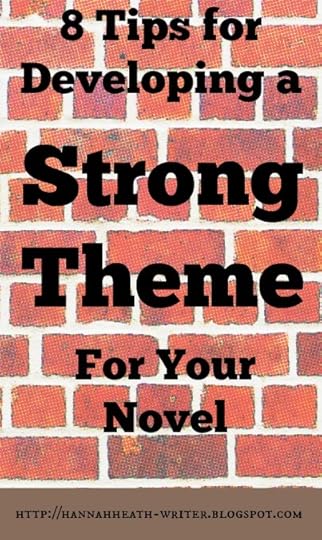 1. Don't worry about making your theme unique. I know that you want to write something brilliant and new. But here's the problem: There really aren't that many different kinds of themes out there. I can guarantee that whatever you want as your theme has already been done. The idea isn't to come up with a theme nobody's seen before. Good luck with that. No, instead, the idea is to do a theme better than anyone else before you. Clearly that's so much easier.
1. Don't worry about making your theme unique. I know that you want to write something brilliant and new. But here's the problem: There really aren't that many different kinds of themes out there. I can guarantee that whatever you want as your theme has already been done. The idea isn't to come up with a theme nobody's seen before. Good luck with that. No, instead, the idea is to do a theme better than anyone else before you. Clearly that's so much easier.
2. Understand that your story will have more than one theme. I've never read or written a story that only had one theme. I'm not even sure if that's possible. So when all of the possible themes for your story come stampeding toward you, don't panic. Let them all in. Of course, you'll want to narrow them down a bit afterwards by choosing a few main themes, but feel free to let the little ones stay.
3. Pick one or two main themes. You are going to want to focus your energy on only one or two main themes. Trust me. Not only does narrowing it down keep your from going insane, but it really helps streamline the whole process of writing. The themes are the center of your story and you can build outwards from there. Main themes kind of work like those backpack leashes you see tired moms using on their kids: Rather than spending hours chasing after your novel and trying to get it to behave, you attach it it to the theme so that it can't ever get too far away from where you want it. How do you decide where you want it? Read on:
4. Write about what is important to you. Notice that I added "to you" at the end of that sentence. Don't you dare start writing about things that other people deem important. Write what you want to write. It doesn't matter if it's unpopular or overdone or weird or simple. If it's important to you, then run with it. A story can only mean something to readers if it first means something to the author. If you aren't sure what is important to you, here's a good rule of thumb:
5. Write about what scares you. Yep. This is not something that writers want to hear, but I'm saying it anyway. Being a writer means that you need to be somebody who is willing to put your thoughts and emotions on paper. And not the, "I don't like purple," or "Smiling's my favorite" thoughts. I'm talking about the thoughts that scare you. It doesn't necessarily have to be a bad kind of scared. It can be an excited scared or an on-the-brink-of-something-big scared. Or it can just be plain old scared. Whatever makes you feel something deeply: That's what you want to put on paper. This is something I discovered when I wrote Skies of Dripping Gold. The themes are hard ones. I didn't want to put them in there at first. I didn't want people to see that much of my thoughts: The faith struggles, the anger, the fear. But those are all part of me, so I decided to acknowledge that. And you know what? It's the best thing I've ever written. Why? Because it meant something to me. So if you have an idea that you've been holding back because you're afraid of it: Just let it out. If it scares you then you're doing something right.
6. Go deeper. So you have a theme. What is it? Let's use an example. You've decided your theme is going to be, "Dare to become your own person." Okay, that's good. But what's so important about individualism, anyway? Why bother? Consider why some characters would choose to blend in rather than stand out. Think about the consequences of becoming your own person: Can that pursuit turn into selfishness? Look at it from all points of view. Go until you're sure you've seen it all. Once you've reached that point, just keep going. Further up and further in.
7. Connect it to your character. Your main theme should connect to your character on a deep level. No, don't make the theme define your character. You don't want your character suddenly flipping out because he realizes that he's nothing more than a story prop:
 Thankfully, characters and theme often grow up side by side. They want to be together and often find a way to join at the hip without you even trying. If that doesn't happen, then you'll want to go back and see what happened to prevent that natural story flow. 8. Be cool. Despite what you may think, readers are not generally stupid. They can recognize themes fairly well. You don't always have to be winking and nudging, "Did you see that? Riiiight.....there! That's the theme! See. See? Did you see that?!" Themes are supposed to be underlying messages, not sermons in the form of dialogue or a character watching a swiftly flowing river and reflecting on how time waits for nobody. Can we stop with that already? Please?
Thankfully, characters and theme often grow up side by side. They want to be together and often find a way to join at the hip without you even trying. If that doesn't happen, then you'll want to go back and see what happened to prevent that natural story flow. 8. Be cool. Despite what you may think, readers are not generally stupid. They can recognize themes fairly well. You don't always have to be winking and nudging, "Did you see that? Riiiight.....there! That's the theme! See. See? Did you see that?!" Themes are supposed to be underlying messages, not sermons in the form of dialogue or a character watching a swiftly flowing river and reflecting on how time waits for nobody. Can we stop with that already? Please?
Remember, your story probably already has a theme. If you have thoughts and emotions, chances are those seeped into your story, perhaps without you knowing it. All you have to do is uncover it and nurture it a bit. That's both insanely easy and frighteningly difficult. But you can do it. I know you can. So go put together a story that matters. Make your readers feel something. Make sure they remember you long after they finished reading your work.
What theme does your story have? How do you like to handle it? Perhaps you're still working on discovering what your theme is. Let me know what's going on in the comment section below!
Related articles:
The Importance of Asking Why: 4 Questions You Should Ask Yourself as a Writer
Challenging Writers to Create Stories with Meaning
Be a Writer, Not an Author
Enjoy this post? Take a look around. If you like what you see, please don't forget to subscribe by email for a new post every week!
But you know what I can remember? The way the story made me feel.
I’m sure you can identify. We all have our ideas of what makes a good story: an intriguing plot, interesting characters, impressive world-building, brilliant writing. But none of those things matter if the story lacks some kind of theme to bring all of those elements together in one beautiful, cohesive story that makes us feel.
But how do you create a theme? Well, as S.M. Metzler explained in this brilliant post: your story probably already has one. You just need to coax it out. Here’s how:
 1. Don't worry about making your theme unique. I know that you want to write something brilliant and new. But here's the problem: There really aren't that many different kinds of themes out there. I can guarantee that whatever you want as your theme has already been done. The idea isn't to come up with a theme nobody's seen before. Good luck with that. No, instead, the idea is to do a theme better than anyone else before you. Clearly that's so much easier.
1. Don't worry about making your theme unique. I know that you want to write something brilliant and new. But here's the problem: There really aren't that many different kinds of themes out there. I can guarantee that whatever you want as your theme has already been done. The idea isn't to come up with a theme nobody's seen before. Good luck with that. No, instead, the idea is to do a theme better than anyone else before you. Clearly that's so much easier.2. Understand that your story will have more than one theme. I've never read or written a story that only had one theme. I'm not even sure if that's possible. So when all of the possible themes for your story come stampeding toward you, don't panic. Let them all in. Of course, you'll want to narrow them down a bit afterwards by choosing a few main themes, but feel free to let the little ones stay.
3. Pick one or two main themes. You are going to want to focus your energy on only one or two main themes. Trust me. Not only does narrowing it down keep your from going insane, but it really helps streamline the whole process of writing. The themes are the center of your story and you can build outwards from there. Main themes kind of work like those backpack leashes you see tired moms using on their kids: Rather than spending hours chasing after your novel and trying to get it to behave, you attach it it to the theme so that it can't ever get too far away from where you want it. How do you decide where you want it? Read on:
4. Write about what is important to you. Notice that I added "to you" at the end of that sentence. Don't you dare start writing about things that other people deem important. Write what you want to write. It doesn't matter if it's unpopular or overdone or weird or simple. If it's important to you, then run with it. A story can only mean something to readers if it first means something to the author. If you aren't sure what is important to you, here's a good rule of thumb:
5. Write about what scares you. Yep. This is not something that writers want to hear, but I'm saying it anyway. Being a writer means that you need to be somebody who is willing to put your thoughts and emotions on paper. And not the, "I don't like purple," or "Smiling's my favorite" thoughts. I'm talking about the thoughts that scare you. It doesn't necessarily have to be a bad kind of scared. It can be an excited scared or an on-the-brink-of-something-big scared. Or it can just be plain old scared. Whatever makes you feel something deeply: That's what you want to put on paper. This is something I discovered when I wrote Skies of Dripping Gold. The themes are hard ones. I didn't want to put them in there at first. I didn't want people to see that much of my thoughts: The faith struggles, the anger, the fear. But those are all part of me, so I decided to acknowledge that. And you know what? It's the best thing I've ever written. Why? Because it meant something to me. So if you have an idea that you've been holding back because you're afraid of it: Just let it out. If it scares you then you're doing something right.
6. Go deeper. So you have a theme. What is it? Let's use an example. You've decided your theme is going to be, "Dare to become your own person." Okay, that's good. But what's so important about individualism, anyway? Why bother? Consider why some characters would choose to blend in rather than stand out. Think about the consequences of becoming your own person: Can that pursuit turn into selfishness? Look at it from all points of view. Go until you're sure you've seen it all. Once you've reached that point, just keep going. Further up and further in.
7. Connect it to your character. Your main theme should connect to your character on a deep level. No, don't make the theme define your character. You don't want your character suddenly flipping out because he realizes that he's nothing more than a story prop:
 Thankfully, characters and theme often grow up side by side. They want to be together and often find a way to join at the hip without you even trying. If that doesn't happen, then you'll want to go back and see what happened to prevent that natural story flow. 8. Be cool. Despite what you may think, readers are not generally stupid. They can recognize themes fairly well. You don't always have to be winking and nudging, "Did you see that? Riiiight.....there! That's the theme! See. See? Did you see that?!" Themes are supposed to be underlying messages, not sermons in the form of dialogue or a character watching a swiftly flowing river and reflecting on how time waits for nobody. Can we stop with that already? Please?
Thankfully, characters and theme often grow up side by side. They want to be together and often find a way to join at the hip without you even trying. If that doesn't happen, then you'll want to go back and see what happened to prevent that natural story flow. 8. Be cool. Despite what you may think, readers are not generally stupid. They can recognize themes fairly well. You don't always have to be winking and nudging, "Did you see that? Riiiight.....there! That's the theme! See. See? Did you see that?!" Themes are supposed to be underlying messages, not sermons in the form of dialogue or a character watching a swiftly flowing river and reflecting on how time waits for nobody. Can we stop with that already? Please?Remember, your story probably already has a theme. If you have thoughts and emotions, chances are those seeped into your story, perhaps without you knowing it. All you have to do is uncover it and nurture it a bit. That's both insanely easy and frighteningly difficult. But you can do it. I know you can. So go put together a story that matters. Make your readers feel something. Make sure they remember you long after they finished reading your work.
What theme does your story have? How do you like to handle it? Perhaps you're still working on discovering what your theme is. Let me know what's going on in the comment section below!
Related articles:
The Importance of Asking Why: 4 Questions You Should Ask Yourself as a Writer
Challenging Writers to Create Stories with Meaning
Be a Writer, Not an Author
Enjoy this post? Take a look around. If you like what you see, please don't forget to subscribe by email for a new post every week!

Published on May 06, 2016 07:33
April 29, 2016
Steamed Clams Inspired by Anthony Doerr's All the Light We Cannot See
We live in a world where many people live their lives following the same basic pattern: Go to school, go to college, get a job, maybe get married, hopefully don’t get divorced, work for most of your remaining life, then retire when you’re old and too tired to do all of the things you used to think you were going to do.
This pattern has always seemed a bit odd to me. Because it’s not right, is it? Living your life in a way where you’re not really living it at all.
That’s why the All the Light We Cannot See by Anthony Doerr stood out to me so much. It caught me with a single theme that can be summed up in this one quote:
"Don't you want to be alive before you die?"
Marie-Laure’s father works in the Museum of Natural History in Paris. It’s a magnificent place, filled with rare and beautiful treasures. This Marie-Laure knows, though she cannot see them. Struck blind at the age of six, she has learned to see the world without the use of her eyes.
At 12 years of age, the Nazis invade Paris and she runs with her father to Saint-Malo, a beautiful town by the sea, where her reclusive great uncle takes them in. With them they carry what might be the museum’s most precious jewel: The Sea of Flames, a gem said to bring curses on whoever possesses it.
Werner, an orphaned German boy, grows up with a love for radios, fascinated by how unseeable wavelengths can fly through to air to share news and music and education. He becomes talented at the operation and construction of these radios, a skill that takes him away from his sister Jutta and into the folds of the Hitler Youth. There, he is assigned to use radios to hunt down those that resist Germany, a task he had once thought honorable but now begins to question. Tortured by the idea that his intelligence is being used to kill numerous people but unable to find a way out, Werner soon finds himself hunting down a resistance in Saint-Malo.
Here, the lives of these two connect: a blind French girl courageous enough to join the resistance and a conflicted German boy struggling to discover how to live before he dies.
The writing was gorgeous, the characters inspiring, the story intriguing, but that’s not why I liked it. I liked it because it made me stop and think, particularly these two quotes, which were reiterated throughout the entire book:
"Don't you want to be alive before you die?"
"A scientist's work is determined by two things: his interests and those of his time."
As I mentioned before, I’ve always been bothered by the zombie-like pattern of this world. Nobody really knows why they follow this pattern or stop to think where this pattern will take them. But is that right?
Should we really let our work be determined by the "interests of our time"? Shouldn't we strive to be alive before we die, to do something that matters? Sure, it's scary, and hard to find our own way, but it’s important to try. As the book puts it, "All your life you wait, and then it finally comes, and are you ready?" Will we be ready to be alive before we die? I hope so.
One of my favorite scenes is where Marie-Laure gets to go down to the sea. She’d never been there before, partly because she was afraid to, and partly because other people were afraid to let her. At first, she is scared to death, but this disappears when she gets down to the beach and hears and feels all of the beauty about her. This is her turning point, the point where she decides to let go of her fear and bitterness and instead be alive.
Because Marie-Laure grows to love the beach and starts collecting all sorts of shells, I thought making steamed clams would be a fitting recipe for this book of the month.
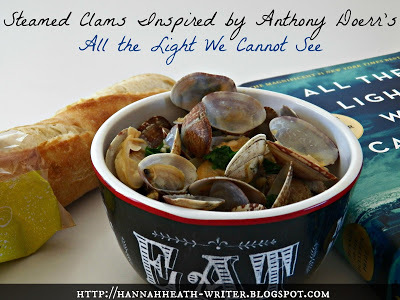 Making a clam dish has always looked really fun to me, but I never did it because I thought it was too complicated. But I decided to face my fears and be alive before….Okay, I’m kidding. That’s not what the book was talking about. Still, it was a fun experience. As it turns out, steamed clams are ridiculously easy to make.
Making a clam dish has always looked really fun to me, but I never did it because I thought it was too complicated. But I decided to face my fears and be alive before….Okay, I’m kidding. That’s not what the book was talking about. Still, it was a fun experience. As it turns out, steamed clams are ridiculously easy to make.
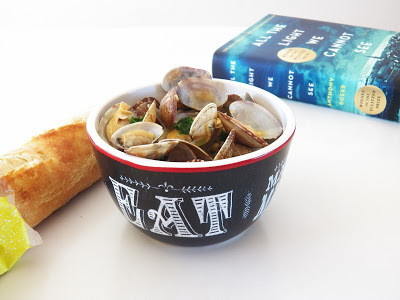 Ingredients –
Ingredients –
2 pounds of steamer clams. I got the frozen kind from Trader Joe's. Yeah, very classy. As it turns out, Trader Joe's puts sauce on their frozen steamer clams, so I had to rinse that part off.1 cup vegetable broth. Juice from half of a lemon 1 to 2 shallots2 cloves of garlic 3 tablespoons of butter. I use cultured butter to make up for the frozen clams. I imagine one uncultured ingredient and one cultured ingredient cancel each other out, right? What, you're saying that's not what "cultured butter" means? *scratches head* That's confusing.ParsleyFrench bread for serving (optional, but recommended)Directions -
1. Melt the butter in a large saucepan. Slice your shallots and throw in the saucepan along with the two cloves of garlic, crushed. Sauté until the shallots become translucent. At this point, your kitchen will smell glorious.
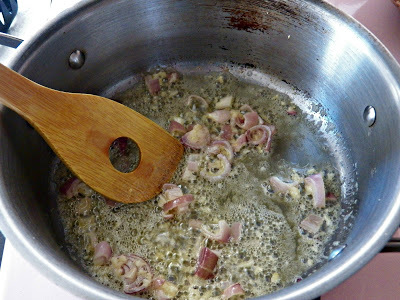 2. Add the vegetable broth and lemon juice. Add your clams, stir briefly. Lower your heat to medium, then cover.
2. Add the vegetable broth and lemon juice. Add your clams, stir briefly. Lower your heat to medium, then cover.
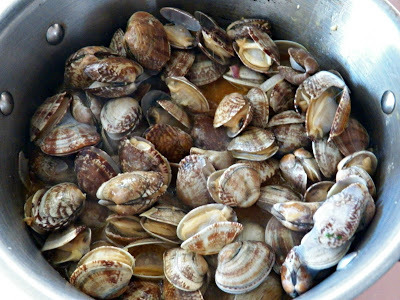 3. Cook for 8 to 10 minutes, shaking the pan every once in a while. I know it's hard, but try not to peek. At the 8 minute point, check to see if the claims have opened. If so, turn off the heat and add the handful of parsley. Stir briefly, then serve.
3. Cook for 8 to 10 minutes, shaking the pan every once in a while. I know it's hard, but try not to peek. At the 8 minute point, check to see if the claims have opened. If so, turn off the heat and add the handful of parsley. Stir briefly, then serve.
 4. The broth tastes awesome, so you might want to have some kind of bread to sop it up with.
4. The broth tastes awesome, so you might want to have some kind of bread to sop it up with.
This dish takes about 15 minutes to make and requires absolutely no skill. On top of that, it tastes really, really good. Seriously. Try it.
I think the best way to enjoy this dish is to eat it while curled up with All the Light We Cannot See, preferably with the French baguette. It'll make you feel more French, oui?
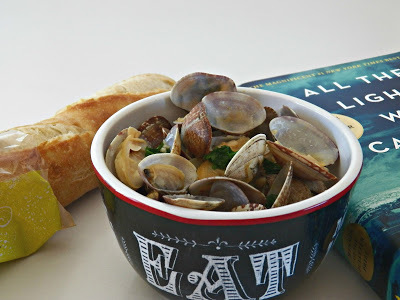 There was one passage at the end of this book that really stuck out to me. When Werner and Marie-Laure meet, he tells her that she is very brave. Her response (with an ellipses to cut out a spoiler):
There was one passage at the end of this book that really stuck out to me. When Werner and Marie-Laure meet, he tells her that she is very brave. Her response (with an ellipses to cut out a spoiler):
"When I lost my sight, Werner, people said I was brave.....But it is not bravery; I have no choice. I wake up and live my life. Don't you do the same?"
Bravery and living, truly living, are entwined into one. They are the same thing. By daring to be alive, we are brave. And by being brave, we are able to be alive.
That's a neat thought to me. All the Light We Cannot See had a lot of neat thoughts, but that was one of my favorites because it reminded me always strive to "wake up and live my life." Don't you want to do the same?
I highly recommend this book. It's a beautiful story that raises a lot of questions: Werner's fight to find what "the right thing" is and how to do it. Marie-Laure's determination to see the world in spite of her fear. It's a beautiful story of strength, resilience, love, and the struggle to discover what's right.
Have you read All the Light We Cannot See ? What are you favorite quotes or themes? If you haven't read it, go get yourself a copy. Then come back and tell me what you thought of it. I'd love to hear from you!
Related articles:
Rosa Hubermann's Pea Soup Inspired by The Book Thief
Paleo Chocolate Pie Inspired by Kathryn Stockett's The Help
In Which I Make Mini Cottleston Pies Inspired by A.A. Milne's The World of Pooh
Enjoy this post? Take a look around. If you like what you see, please don't forget to subscribe by email for a new post every Friday!
Some links are Amazon affiliate links. Thank you for supporting a poor writer.
This pattern has always seemed a bit odd to me. Because it’s not right, is it? Living your life in a way where you’re not really living it at all.
That’s why the All the Light We Cannot See by Anthony Doerr stood out to me so much. It caught me with a single theme that can be summed up in this one quote:
"Don't you want to be alive before you die?"
Marie-Laure’s father works in the Museum of Natural History in Paris. It’s a magnificent place, filled with rare and beautiful treasures. This Marie-Laure knows, though she cannot see them. Struck blind at the age of six, she has learned to see the world without the use of her eyes.
At 12 years of age, the Nazis invade Paris and she runs with her father to Saint-Malo, a beautiful town by the sea, where her reclusive great uncle takes them in. With them they carry what might be the museum’s most precious jewel: The Sea of Flames, a gem said to bring curses on whoever possesses it.
Werner, an orphaned German boy, grows up with a love for radios, fascinated by how unseeable wavelengths can fly through to air to share news and music and education. He becomes talented at the operation and construction of these radios, a skill that takes him away from his sister Jutta and into the folds of the Hitler Youth. There, he is assigned to use radios to hunt down those that resist Germany, a task he had once thought honorable but now begins to question. Tortured by the idea that his intelligence is being used to kill numerous people but unable to find a way out, Werner soon finds himself hunting down a resistance in Saint-Malo.
Here, the lives of these two connect: a blind French girl courageous enough to join the resistance and a conflicted German boy struggling to discover how to live before he dies.
The writing was gorgeous, the characters inspiring, the story intriguing, but that’s not why I liked it. I liked it because it made me stop and think, particularly these two quotes, which were reiterated throughout the entire book:
"Don't you want to be alive before you die?"
"A scientist's work is determined by two things: his interests and those of his time."
As I mentioned before, I’ve always been bothered by the zombie-like pattern of this world. Nobody really knows why they follow this pattern or stop to think where this pattern will take them. But is that right?
Should we really let our work be determined by the "interests of our time"? Shouldn't we strive to be alive before we die, to do something that matters? Sure, it's scary, and hard to find our own way, but it’s important to try. As the book puts it, "All your life you wait, and then it finally comes, and are you ready?" Will we be ready to be alive before we die? I hope so.
One of my favorite scenes is where Marie-Laure gets to go down to the sea. She’d never been there before, partly because she was afraid to, and partly because other people were afraid to let her. At first, she is scared to death, but this disappears when she gets down to the beach and hears and feels all of the beauty about her. This is her turning point, the point where she decides to let go of her fear and bitterness and instead be alive.
Because Marie-Laure grows to love the beach and starts collecting all sorts of shells, I thought making steamed clams would be a fitting recipe for this book of the month.
 Making a clam dish has always looked really fun to me, but I never did it because I thought it was too complicated. But I decided to face my fears and be alive before….Okay, I’m kidding. That’s not what the book was talking about. Still, it was a fun experience. As it turns out, steamed clams are ridiculously easy to make.
Making a clam dish has always looked really fun to me, but I never did it because I thought it was too complicated. But I decided to face my fears and be alive before….Okay, I’m kidding. That’s not what the book was talking about. Still, it was a fun experience. As it turns out, steamed clams are ridiculously easy to make. Ingredients –
Ingredients –2 pounds of steamer clams. I got the frozen kind from Trader Joe's. Yeah, very classy. As it turns out, Trader Joe's puts sauce on their frozen steamer clams, so I had to rinse that part off.1 cup vegetable broth. Juice from half of a lemon 1 to 2 shallots2 cloves of garlic 3 tablespoons of butter. I use cultured butter to make up for the frozen clams. I imagine one uncultured ingredient and one cultured ingredient cancel each other out, right? What, you're saying that's not what "cultured butter" means? *scratches head* That's confusing.ParsleyFrench bread for serving (optional, but recommended)Directions -
1. Melt the butter in a large saucepan. Slice your shallots and throw in the saucepan along with the two cloves of garlic, crushed. Sauté until the shallots become translucent. At this point, your kitchen will smell glorious.
 2. Add the vegetable broth and lemon juice. Add your clams, stir briefly. Lower your heat to medium, then cover.
2. Add the vegetable broth and lemon juice. Add your clams, stir briefly. Lower your heat to medium, then cover. 3. Cook for 8 to 10 minutes, shaking the pan every once in a while. I know it's hard, but try not to peek. At the 8 minute point, check to see if the claims have opened. If so, turn off the heat and add the handful of parsley. Stir briefly, then serve.
3. Cook for 8 to 10 minutes, shaking the pan every once in a while. I know it's hard, but try not to peek. At the 8 minute point, check to see if the claims have opened. If so, turn off the heat and add the handful of parsley. Stir briefly, then serve. 4. The broth tastes awesome, so you might want to have some kind of bread to sop it up with.
4. The broth tastes awesome, so you might want to have some kind of bread to sop it up with.This dish takes about 15 minutes to make and requires absolutely no skill. On top of that, it tastes really, really good. Seriously. Try it.
I think the best way to enjoy this dish is to eat it while curled up with All the Light We Cannot See, preferably with the French baguette. It'll make you feel more French, oui?
 There was one passage at the end of this book that really stuck out to me. When Werner and Marie-Laure meet, he tells her that she is very brave. Her response (with an ellipses to cut out a spoiler):
There was one passage at the end of this book that really stuck out to me. When Werner and Marie-Laure meet, he tells her that she is very brave. Her response (with an ellipses to cut out a spoiler):"When I lost my sight, Werner, people said I was brave.....But it is not bravery; I have no choice. I wake up and live my life. Don't you do the same?"
Bravery and living, truly living, are entwined into one. They are the same thing. By daring to be alive, we are brave. And by being brave, we are able to be alive.
That's a neat thought to me. All the Light We Cannot See had a lot of neat thoughts, but that was one of my favorites because it reminded me always strive to "wake up and live my life." Don't you want to do the same?
I highly recommend this book. It's a beautiful story that raises a lot of questions: Werner's fight to find what "the right thing" is and how to do it. Marie-Laure's determination to see the world in spite of her fear. It's a beautiful story of strength, resilience, love, and the struggle to discover what's right.
Have you read All the Light We Cannot See ? What are you favorite quotes or themes? If you haven't read it, go get yourself a copy. Then come back and tell me what you thought of it. I'd love to hear from you!
Related articles:
Rosa Hubermann's Pea Soup Inspired by The Book Thief
Paleo Chocolate Pie Inspired by Kathryn Stockett's The Help
In Which I Make Mini Cottleston Pies Inspired by A.A. Milne's The World of Pooh
Enjoy this post? Take a look around. If you like what you see, please don't forget to subscribe by email for a new post every Friday!
Some links are Amazon affiliate links. Thank you for supporting a poor writer.

Published on April 29, 2016 07:47
April 22, 2016
Looking at the World Through Lyme-Colored Glasses: Why Faith Doesn't Always Equal Healing
I’ve always had a hard time with Disney movies. Sure, they’re fun to watch. They have beautiful music, whimsical animals, are set in amazing places, and they always end with two people living happily ever after.
Some viewers are bothered by the talking animals, but not me. Others are bothered by the strange tendency for characters to randomly burst into song, but I find it funny. So what’s the problem?
It’s that closing scene that always gets me. The part where everything ends perfectly. All of the problems the characters faced suddenly melt away as if they never happened. And the future? It’s all rainbows and sunshine.
And, while that makes a lot of people happy, that bit bugs me. Because it’s a lie, isn’t it?
I don’t like being lied to.
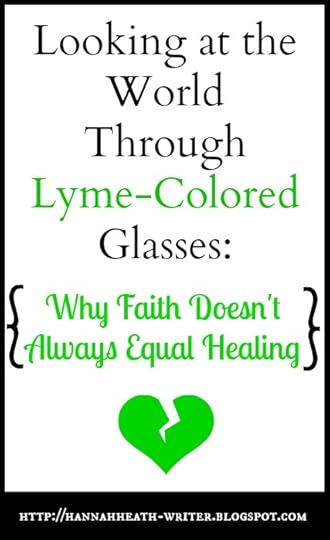 My development of Lyme disease began as a slow process. It started out with tiny problems. My jaw hurt. My hands hurt.
My development of Lyme disease began as a slow process. It started out with tiny problems. My jaw hurt. My hands hurt.
Then, one summer, the problems when downhill very fast. I suddenly found myself as a writer unable to use her hands without great pain. A surfer who can no longer surf and an exercise junkie who can no longer exercise. Pain became normal and smiles became the exact opposite. I saw my world turn from full-color to gray and, having never experienced Lyme disease before, I didn’t know how to paint brightness back into my life.
I prayed a lot. I read the Bible. I assumed that God was going to fix it soon. Because he’s God and God fixes things, right? He heals. That’s what he does. I’d read and heard about him doing it for other people, so he’d do it for me.
But then months...and years...went by and he didn’t. And I couldn’t understand. Hadn’t I done everything right? I prayed. I read the Bible. I believed and I had faith. So where was my healing?
I know that, at this point, a lot of people start to think that maybe they just don’t have enough faith. Maybe, if they believe a bit harder, God will heal them.
I never once thought this. I’ve always had faith. It never crossed my mind that God couldn’t fix Lyme.
And that made it worse. Because if God had the ability to heal me, then what the hell was he waiting for?
I didn’t know. But I did know one thing. On bad days, that one thing played over and over in my head:
You lied. You lied to me. You said you would help me and you didn’t. You lied. Why?
I was convinced that he had lied. Where did I get an idea like that? It’s not like the Bible ever says anything about healing people who ask for it and have faith.
Oh. Wait. It does:
And the prayer offered in faith will make the sick person well; the Lord will raise them up. James 5:14-15
Ask and it will be given to you; seek and you will find; knock and the door will be opened to you. Matthew 7:7
Praise the Lord, my soul, and forget not all his benefits - who forgives all your sins and heals all your diseases. Psalm 103:2-3
Truly I tell you, if you have faith as small as a mustard seed, you can say to this mountain, ‘Move from here to there,’ and it will move. Nothing will be impossible for you. Matthew 17:20-21
Being an intelligent human being and a gifted writer, I was able to pose an eloquent question to all of these verses:
What the hell?
What the HELL?!
Because, really, what else was I supposed to think? I didn’t know. The only thing I knew was that I had questions, and none of them had good answers.
What kind of a God says things like that and then just lets people hurt? What kind of a God lies?
Does he think it’s funny? Maybe this is all a joke to him? Maybe he’s just not paying attention any more. Maybe he got bored. Maybe….
The maybes were endless. I cycled through a lot of them before I came to a one that made any kind of sense.
Maybe, my entire life, I’ve been reading those verses the wrong way.
Maybe, all this time, it wasn’t God that was doing the lying.
I realized then that I was looking at the world the way I wanted to see it.
I wanted to believe in a God who physically heals hurting people any time they pray for help, so I did. It was easy to believe, because it fit in with the, “God is good, God is a loving God” mantra that I had steeped myself in.
I never once stopped to consider that maybe God’s idea of good is different from my own. My thoughts were simple on the subject: “Pain bad. God good. God take pain away.”
I guess I’d been viewing God a bit like the Room of Requirement. I needed something, and he’d magically make that something appear because that’s what he does. Clearly, that idea has caused me a lot of pain. I can’t really blame anyone save myself.
When I go back and read the Bible now without trying to put words in God’s mouth, I realize that those verses never promised what I thought they did.
They promised healing, yes.
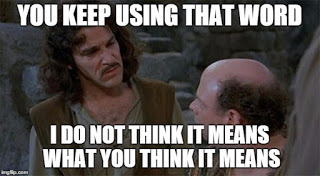 "Healing." Inigo Montoya knows what's up.But they didn’t promise that it would happen immediately. They didn’t even specify whether it was physical healing or spiritual. There’s a large chance that this promised healing comes in the shape of Heaven and eternal salvation.
"Healing." Inigo Montoya knows what's up.But they didn’t promise that it would happen immediately. They didn’t even specify whether it was physical healing or spiritual. There’s a large chance that this promised healing comes in the shape of Heaven and eternal salvation.
And that’s hard for me to accept. Yes, I need salvation and Heaven sounds like a pretty nice place. But my brain cannot fully comprehend these things. All it can comprehend is that my body hurts badly and that my life isn’t what I thought it was going to be. So how am I supposed to hold out through all of this by finding hope in something I can’t understand?
I don’t know.
What I do know is this: God did not lie to me. And that’s one of the most comforting thoughts I’ve had since this entire thing started.
I don’t know if God has plans for physically healing me soon. I don’t even know if he has plans to heal me at all. It’s possible that I’ll wake up tomorrow fully healed. It’s also possible that I will wake up with Lyme disease every day for the rest of my life. Who knows? Not me.
And, while that might seem like a depressing thought, it’s not. Because now I can stop trying to force my idea of how healing should work onto God, who I would assume knows more about it than me. If he heals me of Lyme? Hallelujah! If he doesn’t? Well, that sucks. A lot.
However, I know that even if I'm not healed physically, this soul of mine that Lyme has wreaked havoc with can still be fixed. I may not have had a choice when it comes to getting (or keeping) Lyme disease. That might not heal. But the anger and the bitterness that appeared with it can.
Rather than spending my life waiting for God to fulfill a promise he never made, I think it's best for me to spend my life working towards the promise that he did make. Because this healing I've been waiting for? I've been checking for it in the wrong place.
So whether Lyme is taken from me or remains to stay, I will be healed. Maybe not it the way I expect. Just in the way I need.
What about you? Have you ever struggled with the connection between faith and healing? Please don't hesitate to dump out your thoughts into the comment box below.
Related articles:
Looking at the World Through Lyme-Colored Glasses: Learning to Live With Chronic Pain
Looking at the World Through Lyme-Colored Glasses: What Normal Feels Like
Did you come here looking for a writing tips post? Sorry not to have one for you this week, but allow me to point you towards somebody who does: 10 Ways to Gain Writing Inspiration, a great post by the ever-awesome S.M. Metzler.
Some viewers are bothered by the talking animals, but not me. Others are bothered by the strange tendency for characters to randomly burst into song, but I find it funny. So what’s the problem?
It’s that closing scene that always gets me. The part where everything ends perfectly. All of the problems the characters faced suddenly melt away as if they never happened. And the future? It’s all rainbows and sunshine.
And, while that makes a lot of people happy, that bit bugs me. Because it’s a lie, isn’t it?
I don’t like being lied to.
 My development of Lyme disease began as a slow process. It started out with tiny problems. My jaw hurt. My hands hurt.
My development of Lyme disease began as a slow process. It started out with tiny problems. My jaw hurt. My hands hurt. Then, one summer, the problems when downhill very fast. I suddenly found myself as a writer unable to use her hands without great pain. A surfer who can no longer surf and an exercise junkie who can no longer exercise. Pain became normal and smiles became the exact opposite. I saw my world turn from full-color to gray and, having never experienced Lyme disease before, I didn’t know how to paint brightness back into my life.
I prayed a lot. I read the Bible. I assumed that God was going to fix it soon. Because he’s God and God fixes things, right? He heals. That’s what he does. I’d read and heard about him doing it for other people, so he’d do it for me.
But then months...and years...went by and he didn’t. And I couldn’t understand. Hadn’t I done everything right? I prayed. I read the Bible. I believed and I had faith. So where was my healing?
I know that, at this point, a lot of people start to think that maybe they just don’t have enough faith. Maybe, if they believe a bit harder, God will heal them.
I never once thought this. I’ve always had faith. It never crossed my mind that God couldn’t fix Lyme.
And that made it worse. Because if God had the ability to heal me, then what the hell was he waiting for?
I didn’t know. But I did know one thing. On bad days, that one thing played over and over in my head:
You lied. You lied to me. You said you would help me and you didn’t. You lied. Why?
I was convinced that he had lied. Where did I get an idea like that? It’s not like the Bible ever says anything about healing people who ask for it and have faith.
Oh. Wait. It does:
And the prayer offered in faith will make the sick person well; the Lord will raise them up. James 5:14-15
Ask and it will be given to you; seek and you will find; knock and the door will be opened to you. Matthew 7:7
Praise the Lord, my soul, and forget not all his benefits - who forgives all your sins and heals all your diseases. Psalm 103:2-3
Truly I tell you, if you have faith as small as a mustard seed, you can say to this mountain, ‘Move from here to there,’ and it will move. Nothing will be impossible for you. Matthew 17:20-21
Being an intelligent human being and a gifted writer, I was able to pose an eloquent question to all of these verses:
What the hell?
What the HELL?!
Because, really, what else was I supposed to think? I didn’t know. The only thing I knew was that I had questions, and none of them had good answers.
What kind of a God says things like that and then just lets people hurt? What kind of a God lies?
Does he think it’s funny? Maybe this is all a joke to him? Maybe he’s just not paying attention any more. Maybe he got bored. Maybe….
The maybes were endless. I cycled through a lot of them before I came to a one that made any kind of sense.
Maybe, my entire life, I’ve been reading those verses the wrong way.
Maybe, all this time, it wasn’t God that was doing the lying.
I realized then that I was looking at the world the way I wanted to see it.
I wanted to believe in a God who physically heals hurting people any time they pray for help, so I did. It was easy to believe, because it fit in with the, “God is good, God is a loving God” mantra that I had steeped myself in.
I never once stopped to consider that maybe God’s idea of good is different from my own. My thoughts were simple on the subject: “Pain bad. God good. God take pain away.”
I guess I’d been viewing God a bit like the Room of Requirement. I needed something, and he’d magically make that something appear because that’s what he does. Clearly, that idea has caused me a lot of pain. I can’t really blame anyone save myself.
When I go back and read the Bible now without trying to put words in God’s mouth, I realize that those verses never promised what I thought they did.
They promised healing, yes.
 "Healing." Inigo Montoya knows what's up.But they didn’t promise that it would happen immediately. They didn’t even specify whether it was physical healing or spiritual. There’s a large chance that this promised healing comes in the shape of Heaven and eternal salvation.
"Healing." Inigo Montoya knows what's up.But they didn’t promise that it would happen immediately. They didn’t even specify whether it was physical healing or spiritual. There’s a large chance that this promised healing comes in the shape of Heaven and eternal salvation. And that’s hard for me to accept. Yes, I need salvation and Heaven sounds like a pretty nice place. But my brain cannot fully comprehend these things. All it can comprehend is that my body hurts badly and that my life isn’t what I thought it was going to be. So how am I supposed to hold out through all of this by finding hope in something I can’t understand?
I don’t know.
What I do know is this: God did not lie to me. And that’s one of the most comforting thoughts I’ve had since this entire thing started.
I don’t know if God has plans for physically healing me soon. I don’t even know if he has plans to heal me at all. It’s possible that I’ll wake up tomorrow fully healed. It’s also possible that I will wake up with Lyme disease every day for the rest of my life. Who knows? Not me.
And, while that might seem like a depressing thought, it’s not. Because now I can stop trying to force my idea of how healing should work onto God, who I would assume knows more about it than me. If he heals me of Lyme? Hallelujah! If he doesn’t? Well, that sucks. A lot.
However, I know that even if I'm not healed physically, this soul of mine that Lyme has wreaked havoc with can still be fixed. I may not have had a choice when it comes to getting (or keeping) Lyme disease. That might not heal. But the anger and the bitterness that appeared with it can.
Rather than spending my life waiting for God to fulfill a promise he never made, I think it's best for me to spend my life working towards the promise that he did make. Because this healing I've been waiting for? I've been checking for it in the wrong place.
So whether Lyme is taken from me or remains to stay, I will be healed. Maybe not it the way I expect. Just in the way I need.
What about you? Have you ever struggled with the connection between faith and healing? Please don't hesitate to dump out your thoughts into the comment box below.
Related articles:
Looking at the World Through Lyme-Colored Glasses: Learning to Live With Chronic Pain
Looking at the World Through Lyme-Colored Glasses: What Normal Feels Like
Did you come here looking for a writing tips post? Sorry not to have one for you this week, but allow me to point you towards somebody who does: 10 Ways to Gain Writing Inspiration, a great post by the ever-awesome S.M. Metzler.

Published on April 22, 2016 08:01
April 15, 2016
Inside the Creative's Mind: 9 Things You Should Know
I just finished watching a TV show: Your Lie in April. It is one of the most beautiful visual stories I have ever encountered. What is it? Well, it’s anime. Hey, don’t roll your eyes! Anime can be meaningful. This one is. It's about a young pianist and his struggle to overcome his fears and play music in a way that lets his thoughts and emotions reach others.
As I watched this character work through his creative process, I was completely blown away. I’m not a musician, not by a long shot, but my struggles and triumphs as a writer were very similar to his as a pianist.
That’s when it struck me: Creatives must all have minds that work in similar ways. Not identical. Never identical. Just similar enough so that we all have common ground in our heads.
What kind of a mind does it take to have the ability to make others feel something, understand something, through our creativity? A unique one? A crazed on? A brilliant one? What's it like?
Admit it: Creative people are hard to understand. I mean, I'm a creative person and I sometimes don't understand what goes on in my own mind half the time. I know a lot of creatives feel the same way, and I know that a lot of non-creatives have a hard time understanding their creative friends.
So what is it that goes on in the creative's mind? Let me show you:
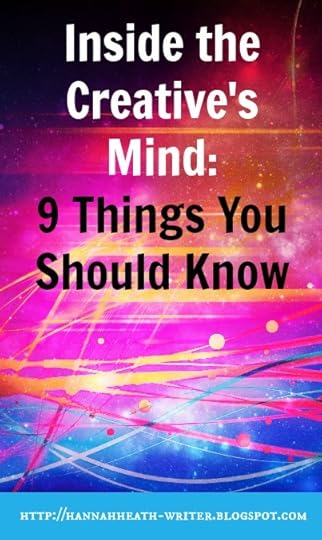 1. We almost always feel like we're on the brink of something big. We're so close. If we could just get this story just right, we'll reach our potential. Play that song just so and it'll change the way we play music forever. Arrange our feelings on the canvas in a certain way and the whole world will see what we want them to see. We're always so. close. But we never quite reach it. And, even if we do, we soon find ourselves standing on another brink. Our work is never done and sometimes that fact hurts. But we keep going because we know the further we get the more we understand and maybe, just maybe, we'll reach the peak some day.
1. We almost always feel like we're on the brink of something big. We're so close. If we could just get this story just right, we'll reach our potential. Play that song just so and it'll change the way we play music forever. Arrange our feelings on the canvas in a certain way and the whole world will see what we want them to see. We're always so. close. But we never quite reach it. And, even if we do, we soon find ourselves standing on another brink. Our work is never done and sometimes that fact hurts. But we keep going because we know the further we get the more we understand and maybe, just maybe, we'll reach the peak some day.
2. We're scared to death that we'll fail. Not necessarily because of what others will think, but because of what we will think. We understand - or think we understand - our own potential, so falling short of that makes us feel like the sorriest piece of skin and bones that ever walked the face of the earth. Because of this, we push ourselves and push ourselves because gosh darnit, we will not fail. Sometimes that nagging voice in our head tells us that we should just quit while we're ahead. Stop creating now before we make a mess of things. But we can't because...
3. Ignoring our creativity is impossible. No matter how hard we try, we will always be writers, artists, musicians. When we're not engaging our creativity, we're thinking about it. Sometimes, when that fear I just talked about starts eating at us, we try to leave everything behind because we think that might make us feel better. But it doesn't, because our creativity is part of us and, at the end of the day, we always find ourselves drawn back to it.
4. We're always dreaming. We dream about where our creativity might take us some day. Will we become professionals in our field? Will we make it big? We can imagine it. And, sometimes, we believe that it will come true. After all, we give imagination life all of the time through our writing and music and artwork. So we think that if we can dream it, we should be able to make it happen. It'll take time and work and, sure, it might not happen. And that'll hurt. But not trying would be even worse, right? So we dream on and keep hoping that that dream will take form.
5. Our minds don't make complete sense, even to us. Sometimes our thoughts are fairly normal: Family, work, school, what we want to eat for lunch. Just your general, run-of-the-mill stuff. But other times it's like Wonderland up there. We're out for a walk, thinking about nothing in particular, and then something catches our eye, inspires us, and our mind bursts with pictures and words and sounds. It can spiral out of control quickly. Sometimes that takes us to depressing, dark places. Other times it lets us tread among the stars. It's miserable and magical, oh yeah....Wait. Woah. Did I just quote Taylor Swift? We will never speak of this again. EVER.
6. We never know quite how we feel about our own work. On one hand: Pride in our success. On the other: painful, agonizing loathing. Creatives are rarely able to see their own work clearly. Take writers, for example:
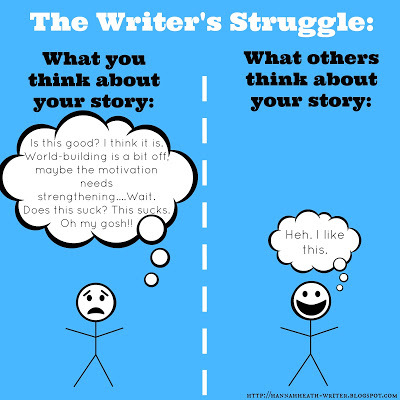 7. Our ability to see things differently can make us feel lonely. We observe closely, listen carefully, seek out new experiences, and rehash old ones. We feel things that most people don't: We feel colors, taste emotions, touch sounds. It's beautiful and heartrending and we want to share it with people, but usually can only do so through our artwork because we suck at talking and assume that people won't understand us anyway. We often get the absurd idea that we are the only people who look at the world the way we do, and that makes us a sad. Because of this...
7. Our ability to see things differently can make us feel lonely. We observe closely, listen carefully, seek out new experiences, and rehash old ones. We feel things that most people don't: We feel colors, taste emotions, touch sounds. It's beautiful and heartrending and we want to share it with people, but usually can only do so through our artwork because we suck at talking and assume that people won't understand us anyway. We often get the absurd idea that we are the only people who look at the world the way we do, and that makes us a sad. Because of this...
8. We hope to reach others through our creativity. Why do you suppose we pour out our hearts for all to see? Because we want to share our world, our hopes and fears and joys and loves with others. This was one of the things that stood out to me in Your Lie in April: Each time the characters sat down at the piano or picked up the violin, they had a single thought: Will it reach them? This is something I wonder every time I sit down to write: Will it reach them? Will people see what I'm trying to help them see? I hope so.
9. We love every inch of this crazy journey. While there are parts of being creative that scares the heck out of us and makes us wish we never started, we're always proud to travel this path. It's who we are and what we do and we don't really want that to change. That's why we keep coming back after a failure, or keep pushing deeper even when we think we've gone as far as we can go. We love this absurdly twisted and colorful path and can't wait to see where it leads.
Maybe there's far more to a creative's mind than that. Or maybe there's far less. But, when I think about writing or come across people with different creative talents, those are the traits that I see most often.
What about you? Do you identify with any of the above? What are some things you think people should know about the creative person's mind?
Also, I don't usually recommend TV shows on here, but I'm going to today: Do yourself a favor at watch Your Lie In April. It's on Netflix and everything about it is gorgeous: The animation, the music, the symbolism, the characters, the themes, the quirkiness. It's a new favorite of mine, in case you couldn't tell. Have you ever seen it? Leave your thoughts below! If not, go watch it and then come sit with me in glossy-eyed admiration.
Related articles:
10 Reasons Why Writers Aren't the Weird Ones
10 Things Nobody Tells You About Being a Writer (Until It's Too Late)
5 Steps to Fighting Off Writer's Insecurity
Enjoy this post? Take a look around. If you like what you see, please don't forget to subscribe by email for a new post every Friday!
As I watched this character work through his creative process, I was completely blown away. I’m not a musician, not by a long shot, but my struggles and triumphs as a writer were very similar to his as a pianist.
That’s when it struck me: Creatives must all have minds that work in similar ways. Not identical. Never identical. Just similar enough so that we all have common ground in our heads.
What kind of a mind does it take to have the ability to make others feel something, understand something, through our creativity? A unique one? A crazed on? A brilliant one? What's it like?
Admit it: Creative people are hard to understand. I mean, I'm a creative person and I sometimes don't understand what goes on in my own mind half the time. I know a lot of creatives feel the same way, and I know that a lot of non-creatives have a hard time understanding their creative friends.
So what is it that goes on in the creative's mind? Let me show you:
 1. We almost always feel like we're on the brink of something big. We're so close. If we could just get this story just right, we'll reach our potential. Play that song just so and it'll change the way we play music forever. Arrange our feelings on the canvas in a certain way and the whole world will see what we want them to see. We're always so. close. But we never quite reach it. And, even if we do, we soon find ourselves standing on another brink. Our work is never done and sometimes that fact hurts. But we keep going because we know the further we get the more we understand and maybe, just maybe, we'll reach the peak some day.
1. We almost always feel like we're on the brink of something big. We're so close. If we could just get this story just right, we'll reach our potential. Play that song just so and it'll change the way we play music forever. Arrange our feelings on the canvas in a certain way and the whole world will see what we want them to see. We're always so. close. But we never quite reach it. And, even if we do, we soon find ourselves standing on another brink. Our work is never done and sometimes that fact hurts. But we keep going because we know the further we get the more we understand and maybe, just maybe, we'll reach the peak some day. 2. We're scared to death that we'll fail. Not necessarily because of what others will think, but because of what we will think. We understand - or think we understand - our own potential, so falling short of that makes us feel like the sorriest piece of skin and bones that ever walked the face of the earth. Because of this, we push ourselves and push ourselves because gosh darnit, we will not fail. Sometimes that nagging voice in our head tells us that we should just quit while we're ahead. Stop creating now before we make a mess of things. But we can't because...
3. Ignoring our creativity is impossible. No matter how hard we try, we will always be writers, artists, musicians. When we're not engaging our creativity, we're thinking about it. Sometimes, when that fear I just talked about starts eating at us, we try to leave everything behind because we think that might make us feel better. But it doesn't, because our creativity is part of us and, at the end of the day, we always find ourselves drawn back to it.
4. We're always dreaming. We dream about where our creativity might take us some day. Will we become professionals in our field? Will we make it big? We can imagine it. And, sometimes, we believe that it will come true. After all, we give imagination life all of the time through our writing and music and artwork. So we think that if we can dream it, we should be able to make it happen. It'll take time and work and, sure, it might not happen. And that'll hurt. But not trying would be even worse, right? So we dream on and keep hoping that that dream will take form.
5. Our minds don't make complete sense, even to us. Sometimes our thoughts are fairly normal: Family, work, school, what we want to eat for lunch. Just your general, run-of-the-mill stuff. But other times it's like Wonderland up there. We're out for a walk, thinking about nothing in particular, and then something catches our eye, inspires us, and our mind bursts with pictures and words and sounds. It can spiral out of control quickly. Sometimes that takes us to depressing, dark places. Other times it lets us tread among the stars. It's miserable and magical, oh yeah....Wait. Woah. Did I just quote Taylor Swift? We will never speak of this again. EVER.
6. We never know quite how we feel about our own work. On one hand: Pride in our success. On the other: painful, agonizing loathing. Creatives are rarely able to see their own work clearly. Take writers, for example:
 7. Our ability to see things differently can make us feel lonely. We observe closely, listen carefully, seek out new experiences, and rehash old ones. We feel things that most people don't: We feel colors, taste emotions, touch sounds. It's beautiful and heartrending and we want to share it with people, but usually can only do so through our artwork because we suck at talking and assume that people won't understand us anyway. We often get the absurd idea that we are the only people who look at the world the way we do, and that makes us a sad. Because of this...
7. Our ability to see things differently can make us feel lonely. We observe closely, listen carefully, seek out new experiences, and rehash old ones. We feel things that most people don't: We feel colors, taste emotions, touch sounds. It's beautiful and heartrending and we want to share it with people, but usually can only do so through our artwork because we suck at talking and assume that people won't understand us anyway. We often get the absurd idea that we are the only people who look at the world the way we do, and that makes us a sad. Because of this...8. We hope to reach others through our creativity. Why do you suppose we pour out our hearts for all to see? Because we want to share our world, our hopes and fears and joys and loves with others. This was one of the things that stood out to me in Your Lie in April: Each time the characters sat down at the piano or picked up the violin, they had a single thought: Will it reach them? This is something I wonder every time I sit down to write: Will it reach them? Will people see what I'm trying to help them see? I hope so.
9. We love every inch of this crazy journey. While there are parts of being creative that scares the heck out of us and makes us wish we never started, we're always proud to travel this path. It's who we are and what we do and we don't really want that to change. That's why we keep coming back after a failure, or keep pushing deeper even when we think we've gone as far as we can go. We love this absurdly twisted and colorful path and can't wait to see where it leads.
Maybe there's far more to a creative's mind than that. Or maybe there's far less. But, when I think about writing or come across people with different creative talents, those are the traits that I see most often.
What about you? Do you identify with any of the above? What are some things you think people should know about the creative person's mind?
Also, I don't usually recommend TV shows on here, but I'm going to today: Do yourself a favor at watch Your Lie In April. It's on Netflix and everything about it is gorgeous: The animation, the music, the symbolism, the characters, the themes, the quirkiness. It's a new favorite of mine, in case you couldn't tell. Have you ever seen it? Leave your thoughts below! If not, go watch it and then come sit with me in glossy-eyed admiration.
Related articles:
10 Reasons Why Writers Aren't the Weird Ones
10 Things Nobody Tells You About Being a Writer (Until It's Too Late)
5 Steps to Fighting Off Writer's Insecurity
Enjoy this post? Take a look around. If you like what you see, please don't forget to subscribe by email for a new post every Friday!

Published on April 15, 2016 07:42
April 8, 2016
8 Different Kinds of Strengths to Give Your Characters
What do you picture when you think of strength? A buff guy at the gym? A single mom working hard to raise her children? A group of people standing up for their beliefs? We all have our different ideas of what strength is, probably because there are so many different kinds.
I think this is something that is important for authors to keep in mind when crafting characters. Writers often have a specific kind of strength that they prefer, whether that’s because it’s the kind of strength they admire, the kind that is easiest to write about, or the kind that is currently trending in popular books. This can lead to stories that have characters with very similar personalities and emotional responses.
Having characters with similar strengths and weaknesses can hurt a story because it leads to monotony and flat, rushed-feeling characters. So here is a list of the different kinds of character strengths for you to keep in mind while writing. It will help make your characters deeper and more diverse:
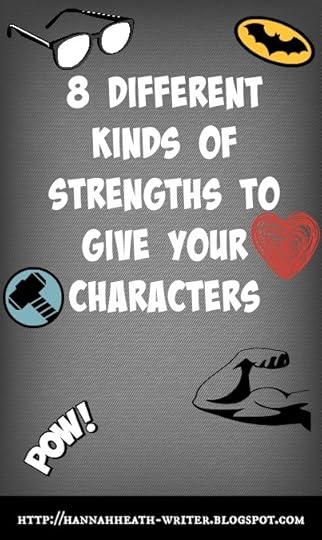 1. Warrior Strength. Also known as badassery. These are the kind of characters who won’t let anything stand in their way. They tend to be fairly stoic, physically strong, and mentally hardened. The gates of hell are filled with the screams for their victims. Surrounding characters either help them or get out of their way. You know that they can push through practically any situation simply because they've made up their minds to do so....And they'll look cool while doing it. It's impressive and inspiring. However, "coolness" is generally not enough to give your character a deep personality. Why is your character so strong? Was she always like this or did something happen? What is he/she fighting so fiercely for? Give him a reason. Examples of well-done warrior strength: Jason Bourne, Ottway (The Grey), Ripley, Maximus, Batman, Break (Pandora Hearts), Kvothe.
1. Warrior Strength. Also known as badassery. These are the kind of characters who won’t let anything stand in their way. They tend to be fairly stoic, physically strong, and mentally hardened. The gates of hell are filled with the screams for their victims. Surrounding characters either help them or get out of their way. You know that they can push through practically any situation simply because they've made up their minds to do so....And they'll look cool while doing it. It's impressive and inspiring. However, "coolness" is generally not enough to give your character a deep personality. Why is your character so strong? Was she always like this or did something happen? What is he/she fighting so fiercely for? Give him a reason. Examples of well-done warrior strength: Jason Bourne, Ottway (The Grey), Ripley, Maximus, Batman, Break (Pandora Hearts), Kvothe. 2. Moral Strength. This character knows what she believes in and does not allow circumstances to change her personality. Despite how popular antiheroes are becoming, readers do still love characters with a good set of morals. There's something nice about always knowing where a person stands, and it's always inspiring when an otherwise normal person has the strength to stand up for what they believe in and simply do the right thing. Examples of characters with great moral strength: Captain America, Atticus Finch, Murdoch (Murdoch Mysteries), Starbuck (Moby Dick), Jane Eyre, Superman, Faramir, Elinor Dashwood. For a more extensive list put together by my amazing followers, click here.
3. Quiet Strength. This kind of strength is not flashy. Usually, characters with quiet strength aren't very noticeable at first. You don't expect much out of them, but then something happens and you realize that this character is probably stronger than everyone else combined. They may not be physically strong, but they have other skills or great mental fortitude. They either underestimate their own strength, or are so confident in their abilities that they don't feel the need to be recognized by anybody else. Examples: Samwise Gamgee, Shane, Marie-Laure (All the Light We Cannot See), Hiccup, Cinderella (the 2015 version).
4. Defiant Strength. This character draws strength from anger and the need to prove something. Somebody told him that he couldn't achieve a goal, often because of his social status, race, physical/mental abilities, or past, and he's out to prove that person wrong. Sometimes, he is trying to prove something to himself rather than somebody else. This is a really interesting kind of strength and makes for a very complex character. Examples would be: Trip (Glory), Rocket Raccoon, Eowyn, Thorin, Celia Foote.
5. Fighter strength. This is very different from warrior strength. Why? Because characters with this kind of strength don't always succeed. They're normal people without any special skills who are thrust into bad situations. But they suck it up and keep going anyway because they're fighters and that's what they do. They try, they fail, but they get back up and try again because they could do this all day. Examples: Papillion, Mark Watney, Pollyanna, Louie Zamperini, Mattie Ross, Frodo.
6. Unstable Strength. This character is very driven and is good at whatever particular field they are in. However, they are slightly unhinged mentally. They may be afraid of their instability and what it might cause them to do, or they might embrace their insanity and use it as a tool. Strong in many different ways, yet afraid of their own minds, this is typically the kind of strength given to a villain, a struggling hero, or a revenge-driven character. Examples: the Joker, Harvey Dent, Green Arrow, Loki, Katniss.
7. Unknown Strength. Often reserved for characters who are put-upon and demeaned. When this character looks at himself, he sees only weaknesses. When other characters look at him, they see an amazing person who has endured a lot and yet still keeps going. But, when they attempt to point this out to him, he doesn't really believe that that's anything special. Usually, by the end of the story, these characters come to realize their value. Examples: Kousei (Your Lie in April), Neville Longbottom, Aelliana Caylon (Scout's Progress).
8. Pillar Strength. No matter what is going on, this character is there to lean on. She's the loyal, steadfast friend who will tell it like it is and keep everyone from going crazy. However, because this character is so busy being strong for other people, she often feels isolated because nobody can help her with her own problems. Examples: Beth (Little Women), Alfred Pennyworth, Newt.
See how many different kinds of strength there are? I only listed 8 main ones, but there are many others. Fascinating, isn't it? I often use the above list in my own writing as a way to craft my character's personalities and avoid giving cliche or repetitive attributes. It's a lot of fun and has worked out very well for me, so I wanted to share.
Remember, a character can possess several different kinds of these strengths at once, or their character arc might involve them swinging from one to another. Try mixing, matching, and adding in other kinds of strengths.
What do you think? What kind of strengths do you tend to give your characters? Did I miss any? Please leave a comment below, and don't forget to tell me about some of your favorite characters and the kind of strengths that they possess!
Related articles:
The Dos and Don'ts of Writing Characters with Special Powers - Guest Post on Tamara Reuveni's Blog
Writing Strong Female Characters: What You're Doing Wrong
Writing Awesome Male Characters: What You're Doing Wrong
Enjoy this post? Please share on social media and take a look around. If you like what you see, don't forget to subscribe by email for a new post every Friday!

Published on April 08, 2016 07:54
April 1, 2016
4 Fundamental Errors in the Diverse Books Campaign (And How to Fix Them)
Diverse books. It sounds like such a nice thing. It sounds like an all-inclusive, colorful, eye-opening, interesting campaign.
It sounds like it, but it's not. I do think that people wanted it to turn out that way, though. In fact, I think that a lot of people think that it did turn out that way.
But when you look at the "we need diverse books campaign," and I mean really look at it, it's clear that something has gone horribly wrong.
Now, before you decide to throw me into the Petranaki arena, give me a chance to explain. Here are 4 errors I've noticed in the diverse books campaign, along with some suggestions as to how to fix them:
 Error #1: It's not as diverse as it professes to be. People seem to think that populating a book with gay characters and African-Americans makes a book diverse. It doesn't. Yeah, shocking. See, it seems that, when people think of diverse, they're thinking of hot topic minorities. Currently, those hot topic minorities are gays and "people of color," a term that people seem to think is synonymous with African-American (fun fact: it isn't). Okay, so a few books throw in Latino and Islamic characters. And, as we all know, the world is completely made up of African-Americans, Latinos, gays, and Islamics. It's not like we're missing any groups of people. Pfft. Please. Look at us. We're so diverse.
Error #1: It's not as diverse as it professes to be. People seem to think that populating a book with gay characters and African-Americans makes a book diverse. It doesn't. Yeah, shocking. See, it seems that, when people think of diverse, they're thinking of hot topic minorities. Currently, those hot topic minorities are gays and "people of color," a term that people seem to think is synonymous with African-American (fun fact: it isn't). Okay, so a few books throw in Latino and Islamic characters. And, as we all know, the world is completely made up of African-Americans, Latinos, gays, and Islamics. It's not like we're missing any groups of people. Pfft. Please. Look at us. We're so diverse.
Solution #1: Go outside and look around. Then write down what you see. As long as you have eyes and don't live in Antarctica, this is probably what you'll see: People. Pure and simple. You'll see human beings, not people labeled as minorities or hot topic issues. Go put that in a book. Write about the girl who likes to play the violin who also happens to be Samoan. Show the man who is getting his Masters in biology, likes cream soda, is half African American and half Mexican, and goes to mass every Sunday. Tell us about the young man who loves video games, enters in skateboarding competitions, and is struggling with his sexuality. Your characters should be people first. Don't try to define them by one part of their life, such as ethnicity, sexual orientation, disability, or religion. Yes, those are important and help shape people's personalities, but people are more than their labels. So open your eyes and start looking at people as people, not as "diversities."
Error #2: It's being exploited as a sales point. I can't tell you how many books I've read that won awards, got great reviews, are of "critical acclaim," and also happen to be some of the suckiest stories I've ever read. I rub my eyes, stare at the pages, and try to figure out how in the world this book got so much attention. And then I see it: the Asian and lesbian supporting characters and the main character (conveniently both religionless and without ethnicity) that learns to be accepting of everybody. Clearly, that's what makes a good story. It's not as if plot line, dialogue, or writing style have anything to do with it. Duh. Should've caught that earlier.
Solution #2: Don't just blindly follow a trend because it gets sales now. If supplying diverse books is really your passion, then go after it with all of your heart. Good for you. But if you're just throwing in so-called diversity to get a publisher's attention, stop. Not only will those aspects feel forced in your story, but you're going to be selling your soul to the whims of the publishing industry. Yes, I said whims because here's the truth: if disabled dogs was a hot topic right now, that's what publishing houses would pretend to be caring about, not diverse books. Harsh? Yes. Disgusting? Definitely. But that's how it is. So instead of joining them in their exploitation, go and write something that you care about, not what the publishing houses are telling you you should care about.
Error #3: The diverse books campaign is always right. Have mercy on the poor soul who dares to point out its flaws, especially if said person happens to be white or straight. Whoops. Did I just write that out? Uh-oh. I think I did. *runs and tries to find a place to hide* Seriously, though. as I sat down to write this, I realized that if I mentioned that I'm a 1/4 Mexican, have Lyme disease, and attend a college that is about as diverse as any one place can get, my words would suddenly become a lot more credible to certain people. And that's just wrong.
Solution #3: People need to be allowed to disagree with one another. People should be able to voice their concerns about having their six-year-old child surrounded by books featuring homosexuality without being shouted down as a bigot. If diversity is such an important topic, then shouldn't it be important enough for people to be able to sit down and have adult conversations about it? I think so. But what do I know? I just have a working brain, something that doesn't seem to count for much these days.
Error #4: Diversity is often shoehorned into a story. I think this is largely a result of error #2 and 3. In an attempt to fit the current market and not come across as square, writers are starting to frantically plop minorities into their stories. I just recently read a book ( Six of Crows ) that had a supporting character that was gay. This character was awesome. He was actually my favorite character in the entire book. But the author kept hinting at the fact that he was gay, over and over and over again, even though it had absolutely no bearing on the storyline. I couldn't help but think that the author was just trying to fill some sort of diversity quota without taking the time to consider how it fit into the story. I keep running across very similar mistakes, such as times when an author feels it necessary to keep pointing out that a character is black or Islamic, though doesn't ever stop to point out why this matters to the story (or the character).
Solution #4: Make it matter to the story. This goes back to solution #1. Write your character as a human being. Tell us who he/she is and explain how their "diversity" affects them in the storyline. Maybe your character is extremely feisty though slightly insecure, something that is connected to the fact that she has a birth defect that makes it difficult for her to talk clearly. This defect is part of her, just like the fact that she's good at karate and adores her dad, so make that part of the storyline, not a weird "oh yeah, she has a speech impediment" add on. Or you could take a different approach, one that I learned from Ursula K. Le Guin. In The Wizard of Earthsea , the main character is brown-skinned and his best friend is black. This is mentioned a few times in passing, simply because that's how the people in her world looked. She didn't make a big deal out of it. She just wrote it that way because that's what's real: In our world, there are people with dark brown skin and black skin, so why shouldn't they go into her fantasy novel? It gave her world a very realistic feel. All that to say: Your characters "diverseness" should matter to the story and make sense within it rather than being something you can use to make your story seem open-minded and hip.
Now, I am fully aware that the stance that I have just taken is not extremely popular. But I didn't write this post to be popular: I wrote it because this is a problem that bothers me, and because I see a lot of potential in the diverse book campaigns that is being wasted. I'd like to see that change. Who's with me?
Is my assessment right? Completely wrong? Why? I would love to hear your thoughts on the diverse books campaign. All I ask is that you keep your comments thoughtful and respectful. Also, it would be nice if people would read my post in its entirety before leaving an angry comment, but that might be a little bit too much to ask.
Related articles:
Challenging Writers to Write Stories with Meaning
7 Cliche Characters in YA Fiction That Need to Stop
Writing What You Want to Write: Why You Shouldn't Follow the Current Writing Trends
Enjoy this post? Please share on social media and take a look around. If you like what you see, don't forget to subscribe by email for a new post every Friday!
It sounds like it, but it's not. I do think that people wanted it to turn out that way, though. In fact, I think that a lot of people think that it did turn out that way.
But when you look at the "we need diverse books campaign," and I mean really look at it, it's clear that something has gone horribly wrong.
Now, before you decide to throw me into the Petranaki arena, give me a chance to explain. Here are 4 errors I've noticed in the diverse books campaign, along with some suggestions as to how to fix them:
 Error #1: It's not as diverse as it professes to be. People seem to think that populating a book with gay characters and African-Americans makes a book diverse. It doesn't. Yeah, shocking. See, it seems that, when people think of diverse, they're thinking of hot topic minorities. Currently, those hot topic minorities are gays and "people of color," a term that people seem to think is synonymous with African-American (fun fact: it isn't). Okay, so a few books throw in Latino and Islamic characters. And, as we all know, the world is completely made up of African-Americans, Latinos, gays, and Islamics. It's not like we're missing any groups of people. Pfft. Please. Look at us. We're so diverse.
Error #1: It's not as diverse as it professes to be. People seem to think that populating a book with gay characters and African-Americans makes a book diverse. It doesn't. Yeah, shocking. See, it seems that, when people think of diverse, they're thinking of hot topic minorities. Currently, those hot topic minorities are gays and "people of color," a term that people seem to think is synonymous with African-American (fun fact: it isn't). Okay, so a few books throw in Latino and Islamic characters. And, as we all know, the world is completely made up of African-Americans, Latinos, gays, and Islamics. It's not like we're missing any groups of people. Pfft. Please. Look at us. We're so diverse.Solution #1: Go outside and look around. Then write down what you see. As long as you have eyes and don't live in Antarctica, this is probably what you'll see: People. Pure and simple. You'll see human beings, not people labeled as minorities or hot topic issues. Go put that in a book. Write about the girl who likes to play the violin who also happens to be Samoan. Show the man who is getting his Masters in biology, likes cream soda, is half African American and half Mexican, and goes to mass every Sunday. Tell us about the young man who loves video games, enters in skateboarding competitions, and is struggling with his sexuality. Your characters should be people first. Don't try to define them by one part of their life, such as ethnicity, sexual orientation, disability, or religion. Yes, those are important and help shape people's personalities, but people are more than their labels. So open your eyes and start looking at people as people, not as "diversities."
Error #2: It's being exploited as a sales point. I can't tell you how many books I've read that won awards, got great reviews, are of "critical acclaim," and also happen to be some of the suckiest stories I've ever read. I rub my eyes, stare at the pages, and try to figure out how in the world this book got so much attention. And then I see it: the Asian and lesbian supporting characters and the main character (conveniently both religionless and without ethnicity) that learns to be accepting of everybody. Clearly, that's what makes a good story. It's not as if plot line, dialogue, or writing style have anything to do with it. Duh. Should've caught that earlier.
Solution #2: Don't just blindly follow a trend because it gets sales now. If supplying diverse books is really your passion, then go after it with all of your heart. Good for you. But if you're just throwing in so-called diversity to get a publisher's attention, stop. Not only will those aspects feel forced in your story, but you're going to be selling your soul to the whims of the publishing industry. Yes, I said whims because here's the truth: if disabled dogs was a hot topic right now, that's what publishing houses would pretend to be caring about, not diverse books. Harsh? Yes. Disgusting? Definitely. But that's how it is. So instead of joining them in their exploitation, go and write something that you care about, not what the publishing houses are telling you you should care about.
Error #3: The diverse books campaign is always right. Have mercy on the poor soul who dares to point out its flaws, especially if said person happens to be white or straight. Whoops. Did I just write that out? Uh-oh. I think I did. *runs and tries to find a place to hide* Seriously, though. as I sat down to write this, I realized that if I mentioned that I'm a 1/4 Mexican, have Lyme disease, and attend a college that is about as diverse as any one place can get, my words would suddenly become a lot more credible to certain people. And that's just wrong.
Solution #3: People need to be allowed to disagree with one another. People should be able to voice their concerns about having their six-year-old child surrounded by books featuring homosexuality without being shouted down as a bigot. If diversity is such an important topic, then shouldn't it be important enough for people to be able to sit down and have adult conversations about it? I think so. But what do I know? I just have a working brain, something that doesn't seem to count for much these days.
Error #4: Diversity is often shoehorned into a story. I think this is largely a result of error #2 and 3. In an attempt to fit the current market and not come across as square, writers are starting to frantically plop minorities into their stories. I just recently read a book ( Six of Crows ) that had a supporting character that was gay. This character was awesome. He was actually my favorite character in the entire book. But the author kept hinting at the fact that he was gay, over and over and over again, even though it had absolutely no bearing on the storyline. I couldn't help but think that the author was just trying to fill some sort of diversity quota without taking the time to consider how it fit into the story. I keep running across very similar mistakes, such as times when an author feels it necessary to keep pointing out that a character is black or Islamic, though doesn't ever stop to point out why this matters to the story (or the character).
Solution #4: Make it matter to the story. This goes back to solution #1. Write your character as a human being. Tell us who he/she is and explain how their "diversity" affects them in the storyline. Maybe your character is extremely feisty though slightly insecure, something that is connected to the fact that she has a birth defect that makes it difficult for her to talk clearly. This defect is part of her, just like the fact that she's good at karate and adores her dad, so make that part of the storyline, not a weird "oh yeah, she has a speech impediment" add on. Or you could take a different approach, one that I learned from Ursula K. Le Guin. In The Wizard of Earthsea , the main character is brown-skinned and his best friend is black. This is mentioned a few times in passing, simply because that's how the people in her world looked. She didn't make a big deal out of it. She just wrote it that way because that's what's real: In our world, there are people with dark brown skin and black skin, so why shouldn't they go into her fantasy novel? It gave her world a very realistic feel. All that to say: Your characters "diverseness" should matter to the story and make sense within it rather than being something you can use to make your story seem open-minded and hip.
Now, I am fully aware that the stance that I have just taken is not extremely popular. But I didn't write this post to be popular: I wrote it because this is a problem that bothers me, and because I see a lot of potential in the diverse book campaigns that is being wasted. I'd like to see that change. Who's with me?
Is my assessment right? Completely wrong? Why? I would love to hear your thoughts on the diverse books campaign. All I ask is that you keep your comments thoughtful and respectful. Also, it would be nice if people would read my post in its entirety before leaving an angry comment, but that might be a little bit too much to ask.
Related articles:
Challenging Writers to Write Stories with Meaning
7 Cliche Characters in YA Fiction That Need to Stop
Writing What You Want to Write: Why You Shouldn't Follow the Current Writing Trends
Enjoy this post? Please share on social media and take a look around. If you like what you see, don't forget to subscribe by email for a new post every Friday!

Published on April 01, 2016 07:34
March 25, 2016
Roasted Vegetable Sandwich Inspired by Christie Golden's Dark Disciple
an·ti·he·ro
ˈan(t)ēˌhirō,ˈan(t)īˌhirō/nouna central character in a story, movie, or drama who lacks conventional heroic attributes.
Translation: An antihero is generally a protagonist who is reaching after an understandable and (mostly) good goal in completely the wrong way and sometimes for the wrong reasons. They often don't acknowledge that their tactics are wrong. Sometimes they swing around to roguish heroes by the end of the story, though often they stay as their pathetically messed up yet endearing selves.
Examples? There are a lot: Jay Gatsby, Severus Snape, Rooster Cogburn, Nyssa Al Ghul, Captain Jack Sparrow, Han Solo, Sherlock Holmes, Scarlett O'Hara, Deathstroke, Rick Blaine. The list goes on and on.
There are a lot of anti-heroes that I'm a huge fan of: Snape being the main one. Recently, I stumbled across an anti-hero that I thought was better done than than most:
Asajj Ventress.
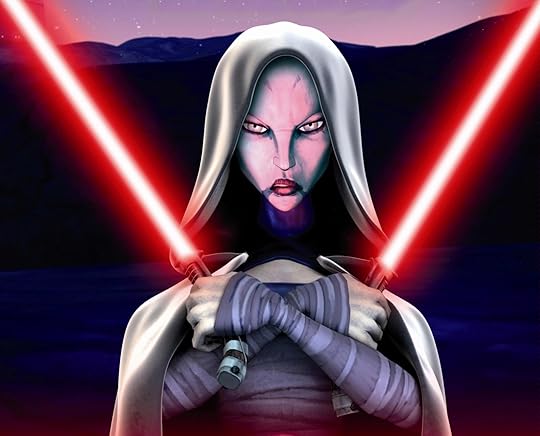 To be honest, I didn't even know who she was before I read Dark Disciple by Christie Golden. Sure, I knew she was a Dark Side Force user with pretty cool lightsabers, but that was where my knowledge ended.
To be honest, I didn't even know who she was before I read Dark Disciple by Christie Golden. Sure, I knew she was a Dark Side Force user with pretty cool lightsabers, but that was where my knowledge ended. But, after reading a book that features her and the Jedi Vos, I became an instant fan. Not only is the book well-written, but the storyline is great, the world-building is cool (of course...it's Star Wars), and the characters are extremely intriguing.
The Clone Wars rage on, the Dark Side facing off against the Republic. Despite the Jedi's best efforts, the death toll continues to rise, Count Dooku's vicious tactics killing many innocent beings. In light of these events, the Jedi make a decision: To combat the Dark Side and put a stop to this bloodshed, they must attempt something that is against the Jedi way: Assassination.
The Council decides that the only way to rid the galaxy of Count Dooku is to use the Dark Side against him. Two dangerous force users are sent to destroy this Sith Lord. Quinlan Vos, a roguish Jedi Knight, and Asajj Ventress, a former Sith apprentice who's hatred for Count Dooku just barely outweighs her contempt for the Jedi.
Asajj is determined to have the head of her former Master and will allow nothing to stand in her way. Her talents as a bounty hunter and strength in the Force are impressive, but she is convinced that Vos must also embrace the Dark Side in order to bring Dooku to justice. But what starts out as a partnership with this strange Jedi Knight soon turns into something very different. When her attempts to strengthen Vos through the Dark Side go horribly awry, she must take on Dooku and battle the Dark Side, not only to gain her revenge, but to save the man she has grown to love.
There are so many things I like about this book, but I'm just going to focus on Asajj Ventress. Her character arc is beyond impressive. All I could do while reading about her was nod my head, tap the pages, and think, "THIS. This is how anti-heroes are done."
There's something extremely awesome about reading of a character who is able to overcome the difficulties around her (and in her). Asajj had a pretty horrible life: She's a Dathomirian female (Yes, she's of the same race as Darth Maul). She was given away as a slave, and then her master was killed. A Jedi Knight took her as his padawan, and then he was killed. She fell to the Dark Side, became the apprentice of Count Dooku, who later tried to kill her. She then went back to Dathomir and became a Nightsister...and then all of her Nightsisters were killed.
If anyone has a right to be angry, it's her. And yet, by the end of Dark Disciple, she is struggling to overcome her darkness. As she moves farther from the Dark Side, Vos gravitates closer and closer to it. So not only does she fight to overcome the Dark Side, but she also fights to rescue Vos from it as well.
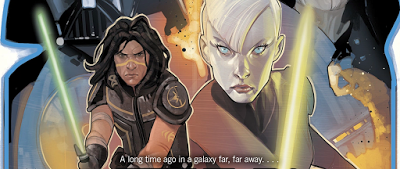 Her strength and determination are unparalleled and very inspiring. By the end of the book all I wanted was for Asajj to overcome her past and find her future: her home among people she loved and who loved her in return.
Her strength and determination are unparalleled and very inspiring. By the end of the book all I wanted was for Asajj to overcome her past and find her future: her home among people she loved and who loved her in return. So, for those of you who want to see how to correctly write an anti-hero (or who just want to read a good Star Wars book), then Dark Disciple is the book you are looking for. Yes, I know that joke is really old. No, I'm not going to stop using it.
Now just give me a second to awkwardly transition into "book inspired recipe" mode.
Okay, awkward transition complete. We may proceed:
I had a hard time finding a recipe to do for this book. I was surprised to learn that Jedi eat steak. I always assumed that they were vegetarian. What's up with that? I mean, you're eating a creature that used to be part of the Force! How does that follow the Jedi code?
A few of the characters ate pastries, so I almost made those just so that I could use the "Come to the Dark Side. We have pastries" line, but decided against it. Jogan fruit is also mentioned, but my local grocery store doesn't sell those. Apparently importing foods from off-world isn't their thing. Oh well.
So I thought I'd make a sandwich of roasted vegetables. This is something Vos munches on while waiting for Asajj to cool down so he can offer her his partnership. Unfortunately, sandwiches aren't very Star Wars-ish, so I decided to spice things up a bit. How? You'll see:
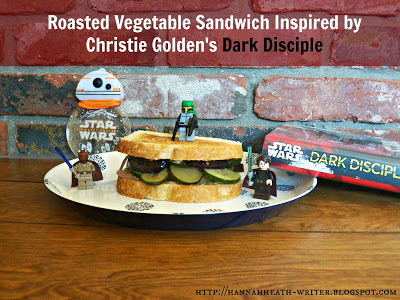 Ingredients -
Ingredients - 1/2 of a large eggplant...or 1 medium one. Your eggplant will probably smell like unripe bananas. That's because of the middle to high potassium content, which is good, because most people are potassium deficient. So eat your eggplant. See? I know stuff other than writing and nerd quotes. Surprise! 2 zucchini 1/2 of a red onion2 cloves of garlic Olive oilBalsamic vinaigrette Salt and pepper1/4 cup of mayonnaise3/4 tablespoon of balsamic vinaigrette 1 green onion, chopped 1/4 teaspoon of garlic powder Bread. I broke my gluten-free misery and used sourdough bread, mostly because my grocery store has a horrible selection as far as gluten-free breads are concerned. But honestly, any kind of hefty bread will do.Directions -
1. Line a baking pan with parchment paper and preheat your oven at 400 degree Fahrenheit. Chop your zucchini into medallions. Slice your eggplant in half lengthwise, then cute into slices. Put these in your baking pan, crush your cloves of garlic over them, and throw in your red onion (sliced into half-moons).
Fun fact: Mace Windu secretly loves eggplant and red onions because they match his lightsaber. Who knew?
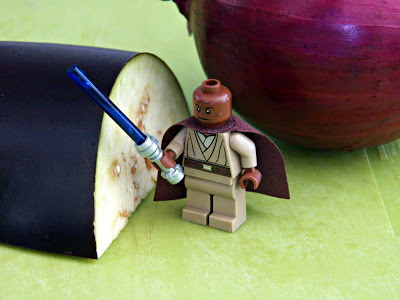 2. Coat the vegetables with olive oil, balsamic vinaigrette, and season with salt and pepper. I didn't measure any of these ingredients. If you're worried, don't be. This kind of cooking doesn't require spot-on measurements. Just fly casual.
2. Coat the vegetables with olive oil, balsamic vinaigrette, and season with salt and pepper. I didn't measure any of these ingredients. If you're worried, don't be. This kind of cooking doesn't require spot-on measurements. Just fly casual. 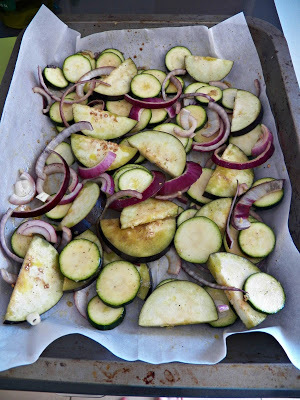 Okay, that's a boring picture and not very Star Wars-ish. Here, try this: Space Veggies!
Okay, that's a boring picture and not very Star Wars-ish. Here, try this: Space Veggies!
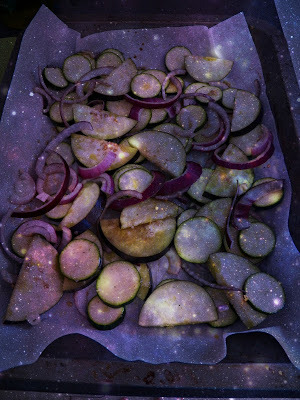 This is Reason #2187 that I should not be allowed on PicMonkey.
This is Reason #2187 that I should not be allowed on PicMonkey.3. Place this pan in the oven. Set the timer for 20 minutes. Don't forget to stir every 5 minutes or so to help them roast evenly.
4. While waiting for the vegetables to roast, you can make your sauce. In a bowl, mix together the mayo, 3/4 teaspoon of balsamic vinaigrette, chopped green onion, and garlic powder. I know it looks kind of gross, but trust me, it tastes good. What? Don't believe me? I find your lack of faith disturbing. Even Obi-Wan approves:
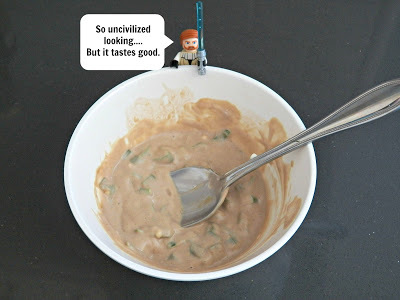 5. Once the veggies are done cooking, allow to cool for a few moments. You can use this time to toast your bread:
5. Once the veggies are done cooking, allow to cool for a few moments. You can use this time to toast your bread: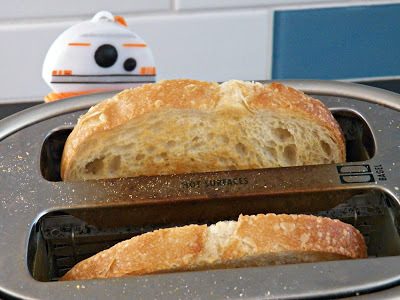 Yes, I am aware that the BB-8 droid was probably not invented back in the Clone Wars. But so what? I take orders from only one person: Me.
Yes, I am aware that the BB-8 droid was probably not invented back in the Clone Wars. But so what? I take orders from only one person: Me.6. Spread your bread with the mayo sauce. Heap as many veggies onto the bread as possible and enjoy.
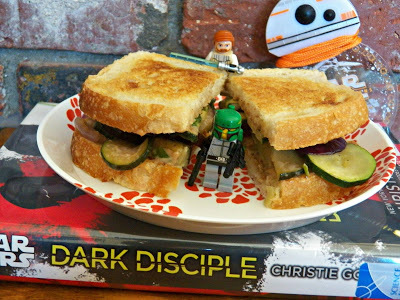 I actually wasn't sure that this was going to taste any good, but it really, really did. You know, sometimes I amaze even myself.
I actually wasn't sure that this was going to taste any good, but it really, really did. You know, sometimes I amaze even myself.Thus far, Dark Disciple has been my favorite Star Wars book. I've only read five, but still. I'm blown away by how great the characterizations were. It's the perfect book for those of you who want to read about Ventress, the Dark Side, or the Clone Wars. I highly recommend it. It's an amazing book that is not only chock full of awesome lightsaber fights and Force-using, but also themes of redemption, love, and perseverance.
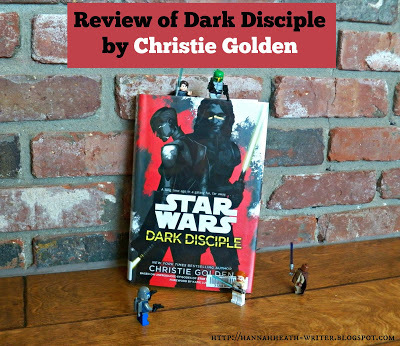 If you're still not sold, I suggest reading this review by Goody, a fellow contributor at Constant Collectible. It's awesome and what first got me wanting to read Dark Disciple.
If you're still not sold, I suggest reading this review by Goody, a fellow contributor at Constant Collectible. It's awesome and what first got me wanting to read Dark Disciple. What Star Wars books have you read and enjoyed? Do you like Asajj Ventress? Let's talk about her and all other favorite anti-heroes in the comments section!
Related articles:
German Potato Salad Inspired by Andy Weir's the Martian
Peanut Brittle Inspired by Douglas Adams' The Hitchhiker's Guide to the Galaxy
Mrs. Weasley's Chocolate Fudge Inspired by Harry Potter and The Sorcerer's Stone
Enjoy this post? Please share on social media and take a look around. If you like what you see, don't forget to subscribe by email for a new post every Friday!

Published on March 25, 2016 07:39
March 18, 2016
If I Had a Million Dollars | A Writers Tag
The other day something really crazy happened. I was out for a walk at the beach, trying to figure out how to rewrite the first chapter of my book. Suddenly, a guy in a suit walked up to me and said, "Hannah Heath, you're great-great uncle in Spain just died."
"But I don't have a great-great uncle in Spain...."
"You are his sole beneficiary. He left you this."
He then dropped a duffle bag at my feet and walked off. I opened the bag and found...1 million dollars!
Okay, so that's not a true story. Bummer, right? What is a true story is that the ever-brilliant Raychel Rose tagged me to participate in the "If I Had a Million Dollars" tag. So I get to pretend that I really do have a great-great Spanish uncle (not sure why he's Spanish, but he is) who died and left me a million dollars. Here are 10 writing-related things that I'd do with it:
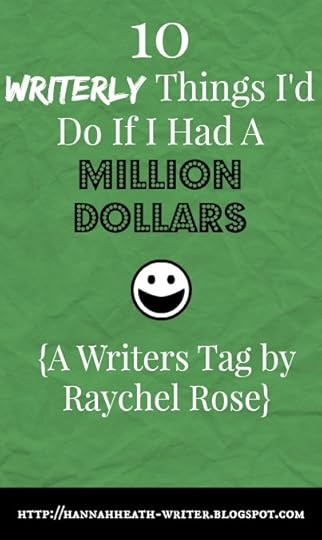 1. Buy a new computer. In case you don't follow me on social media, you should know: My lap top is constantly giving me problems. It's about as annoying and as hate-able as Jar Jar Binks and Professor Umbridge combined. So I'd hit it with a baseball bat, chuck it out the window, burn it, and spit on the ashes. Did I mention that I hate this lap top? I'd then buy two new ones: A desktop computer with two monitors and a small, portable laptop.
1. Buy a new computer. In case you don't follow me on social media, you should know: My lap top is constantly giving me problems. It's about as annoying and as hate-able as Jar Jar Binks and Professor Umbridge combined. So I'd hit it with a baseball bat, chuck it out the window, burn it, and spit on the ashes. Did I mention that I hate this lap top? I'd then buy two new ones: A desktop computer with two monitors and a small, portable laptop.2. Get a writing room + library. One wall would be floor-to-ceiling whiteboard. One wall would be cork board so I could hang up posters of my favorite characters and book art. The third wall would be a window seat overlooking the ocean....Or my own personal lake. I'm not picky. The fourth wall would be a bookshelf that has a hidden door that opens into a massive library. Like this:
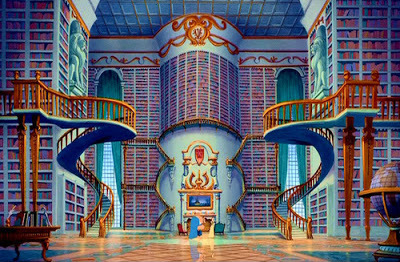 And I don't need it to come with a built-in beast prince boyfriend. Pizza would be fine.
And I don't need it to come with a built-in beast prince boyfriend. Pizza would be fine. 3. Buy all the books. If I'm going to have a library, I'm going to need books. All of them. The classics, the mangas, the indie-published novels, everything that C.S. Lewis ever wrote. I'd also get to finally start a comic book collection.
4. Take a year off of work and college to travel. I'd visit Hobbiton in New Zealand, stop by every famous surf spot and go to every tropical island I could think of. Then I'd tour England, Spain, and France. I've always wanted to go to Cinque Terre. And of course I'd have my lap top with me (one that actually works), so I'd get to write all of the time.
5. Take graphic design, coding, and marketing classes. I'd use this to get out there and build my writer's platform even more. I wouldn't pay somebody to do this for me because I am a control freak like being able to do things myself.
6. Start up an author's guild. I'd like to bring together a group of authors dedicated to revolutionizing the publishing world by writing meaningful, inspiring, and entertaining stories. We'd set up a website and blog encouraging other writers to do the same, go on speaking tours explaining our mission, and do writing workshops and support groups. We'd also set up a program at as many libraries as possible, encouraging people (especially kids and teenagers) to read good, wholesome stories and helping them find encouragement through the written word. It'd be a book club, reading class, and mission work, all wrapped into one.
7. Start a podcast. This is something I've really been wanting to do. I'd be able to buy the correct recording and editing software and then boom! Here comes a podcast full of writing tips, news, book/movie reviews, and nerdiness. It'd be fun.
8. Nerd out. I'd go to the San Diego Comic-Con, Harry Potter World, Disney World, go and see all the superhero and action-adventure movies as soon as they're released, then talk about it on my newly created podcast. I'd buy a bunch of fandom mugs, purses, t-shirts, and movies. I mean, doesn't everyone want a purse with a bounty hunter's helmet on it?
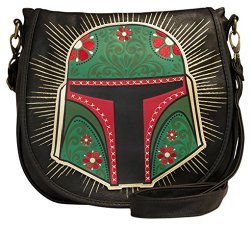
9. Become a superhero. I'd hack into people's social media accounts and correct their spelling, bring plagiarizers to justice, and visit authors in the middle of the night and scare them into writing stories that aren't empty and meaningless. Okay, so maybe a million bucks isn't enough to go all Oliver Queen on people. Also, on second thought, I spend most of my nights reading, so fighting crime would take away my bookworm time. Yeah. Never mind. I'd make the world's worst superhero.
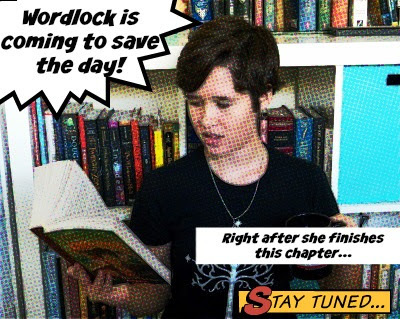
10. Buy all the books. Did I mention this one already? Because seriously. BOOKS.
And there you have it. 10 things I'd do with a million dollars. Though, honestly, if I did somehow get my hands on a million dollars, I probably wouldn't do anything like that. I'd be boringly responsible and put most of it in savings, donate to my church, pay off Lyme treatment bills, buy something practical (like a car), have one heyday at the bookstore, and then lock it all up for my college fund and retirement. Yeah. Live dangerously.
Okay, now I'm going to pick a couple of people to participate. If you are named and don't want to do it, that's fine. It will only break my heart into a million pieces. And if you aren't named and do want to do it, that's fine too. Here we go:
Katherine RebekahMaggie from Maggie's MusingsDragon Harris
I usually tag more people than this, but I'm only doing the above three for two reasons: I'm trying not to tag the same people repeatedly. Also, I want you to have time to check out all of their blogs and get to know them, because they're super fun.
The rules? There are 4: Save this photo to your blog:
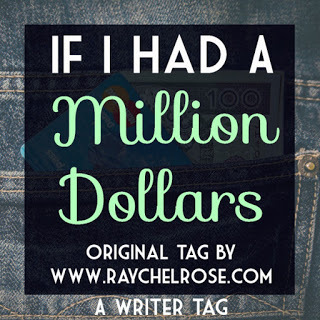 Link back to the person who tagged you (in this case, me), and link back to Raychel Rose's blog, too, because she created this tag. While you're at it, you might as well follow her. She's epic. List 10 writerly things you would do if you had a million dollars. They can be funny, serious, both, neither. You choose. Tag other writer's to participate! What writerly things would YOU do if you had a million dollars? Leave your thoughts below!
Link back to the person who tagged you (in this case, me), and link back to Raychel Rose's blog, too, because she created this tag. While you're at it, you might as well follow her. She's epic. List 10 writerly things you would do if you had a million dollars. They can be funny, serious, both, neither. You choose. Tag other writer's to participate! What writerly things would YOU do if you had a million dollars? Leave your thoughts below! 
Published on March 18, 2016 07:40
March 11, 2016
10 Tips for Using Blogging to Build Your Writer's Platform
Ah. So here you are, seeking wisdom in the blogging department. You must be truly desperate to come to me for help.
Sorry. I'm not one to pass up a good Loki quote.
Despite the fact that I have a very unprofessional propensity for spouting nerd quotes, I do, in fact, know a thing or two about blogging, especially when it comes to using it to build a writer's platform.
A while ago I wrote a post about how to build a successful writer's platform. Since then, I've received a surprising amount of follow-up questions, particularly ones about blogging. How does you start blogging? Which platform should you use? How often should you blog and what should you blog about and how should your blog look and oh my gosh why is this so complicated?
Don't worry. I have answers. *pulls out list* Let's get started. Here are 10 tips for using blogging as a successful writer's platform:
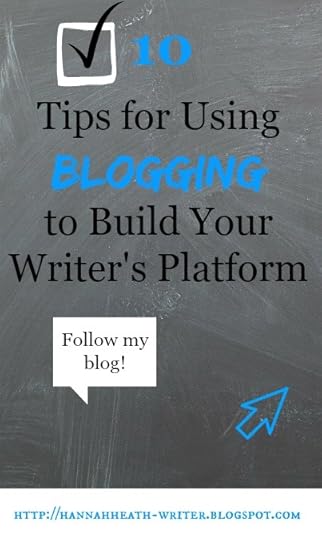 Pick a platform. There are several different places where you can decide to set up camp. Wordpress and Blogger are the most common. Which should you choose? Honestly, that's a matter of preference. Wordpress seems to have a slight edge over Blogger: it's very sleek and user-friendly and has a wide variety of templates. So why do I use Blogger? Because I was using Blogger before Wordpress became popular. I was familiar with it, so when I started this blog, I just automatically went with Blogger. They've been good to me, this blog has good SEO, and I'm happy. So while I'd generally recommend Wordpress, you're probably not going to die if you choose Blogger. However, if you are considering Tumblr, be careful. Tumblr is great, but a lot of people don't have Tumblr accounts and don't read blogs on there, so it's best to use a site specifically designed for blogging. Squarespace is also wonderful. It's what I use for my website. However, it is not free and free is key when first starting out blogging....Especially if you're a poor writer. Keep it simple, stupid. When designing your blog, it's best to keep things low key. Don't worry about making it super fancy. You can always do that later when you're comfortable with how blogging works. Besides, for a writing blog, it's best to have a lot of white space and open areas. Avoid over-cluttering your site and try to use lighter colors. It will make your blog more inviting and people will want to stay longer. Pick a topic for blogging. You will want this to be linked somehow to your writing. After all, the point of this blog is to draw attention to your writing endeavors. A lot of writers choose to blog writing tips. Some do book reviews, some do publishing tips, some do a bit of all of these. These are all great ideas, but you'll need to put your own spin on things to set yourself apart. You also want to make sure that it's something that you personally enjoy writing about. Otherwise, blogging will become a chore and you'll end up closing shop after a few months. Not a good thing. Be personal and personable. Like I said, put your own spin on things. Let your personality spill through. If at all possible, put your picture up on your blog so that people can have a visual of who it is they're reading. The more of a connection you can make with your followers, the better. Not only do you want to show people who you are and what makes you you, you'll also want to make sure that you keep the focus on them. Be pleasant. Respond to commenters, write about things that others will find helpful. Be a pleasant, helpful, intelligent person and you'll do fine. Dedicate. If you're going to do this blogging thing, you have to go all in. Pick how often you want to write (twice a week, weekly, biweekly) and decide what day you want your posts to publish on. This will give your followers something to look forward to. You want them to be able to think: "Oh, yeah, that blogger posts every Wednesday! Today's Wednesday. Wonder what he's writing about." Once you've decided on the day and the frequency, stick with it. If you want writing to become your job, you have to treat it like one. Do or do not. There is no try. Be confident. So maybe you're a young writer. Maybe you're middle-aged but haven't published anything yet. Or perhaps you're older and feel like you're behind the times. You are going to be tempted to write things like, "Now I'm young and have a lot to learn...I've never published before, so take this with a grain of salt..." I see this done often and it hurts me. Do you know how to write? Do you have a brain that works? Then you have just as much of a right to blog as anybody else. Your followers are coming into your house. They want to know what you have to say. It's up to them to decide how intelligent your posts are. Do not undermine yourself. You are a good writer. Don't think you are. Know you are. You want a platform? Alright then. Get out there and fight for it. *battle cries* Follow and interact with other bloggers. That's right. You're going to have to socialize. Hey! Stop running away and come back here. It's not as scary as it sounds. I know a lot of writers, myself included, are introverts. But you can't just build a blog, sit back, and expect people to flood in. It's not that easy. Besides, you don't want followers. You want to build a network of supporters. People who will follow you through Azkaban if you asked them to. The only way to do this is to support them back. Follow people's blogs, leave comments, share on social media. There are lots of great writers out there who are fighting to make it in the publishing world. They can't do it alone and neither can you. So join up. Give yourselves a team name. Fight crime and...oh, wait. We're talking about breaking into the writing world, not vigilante activity. They have a lot of similarities, though, right? Optimize for social media. Keep your titles short and straight-forward. Writing your posts in list format is great. They tend to get more shares because they're easy to skim. Make sure all of your posts have a cover image with the title of your blog post and your blog's link or logo. This will make it more noticeable on Pinterest and Google+. I recommend PicMonkey for this because it's easy, quick, and free. Never be afraid to leave a note at the end of your posts, suggesting that people share your article. Just reminding people can go a long way. Grow a thick skin. You're going to get comments from people who are jerks. Maybe not right away, but it will happen. Just ignore them and keep going. Show the world what you can do. Be willing to fail. Your blogging efforts won't be perfect. You're going to mess up. Maybe your blog will glitch or you'll notice a massive error in one of your posts. And that's okay. It happens to all of us. Why do we fall? So that we can learn to pick ourselves up again. At this point you are either feeling very hopeful or very stressed out. If you're in the latter zone, please don't freak out! Everything is going to be okay. Take a deep breath. Go get some tea or coffee. Eat some chocolate. It helps. Then come back and jump into your platform building. But remember this:
Pick a platform. There are several different places where you can decide to set up camp. Wordpress and Blogger are the most common. Which should you choose? Honestly, that's a matter of preference. Wordpress seems to have a slight edge over Blogger: it's very sleek and user-friendly and has a wide variety of templates. So why do I use Blogger? Because I was using Blogger before Wordpress became popular. I was familiar with it, so when I started this blog, I just automatically went with Blogger. They've been good to me, this blog has good SEO, and I'm happy. So while I'd generally recommend Wordpress, you're probably not going to die if you choose Blogger. However, if you are considering Tumblr, be careful. Tumblr is great, but a lot of people don't have Tumblr accounts and don't read blogs on there, so it's best to use a site specifically designed for blogging. Squarespace is also wonderful. It's what I use for my website. However, it is not free and free is key when first starting out blogging....Especially if you're a poor writer. Keep it simple, stupid. When designing your blog, it's best to keep things low key. Don't worry about making it super fancy. You can always do that later when you're comfortable with how blogging works. Besides, for a writing blog, it's best to have a lot of white space and open areas. Avoid over-cluttering your site and try to use lighter colors. It will make your blog more inviting and people will want to stay longer. Pick a topic for blogging. You will want this to be linked somehow to your writing. After all, the point of this blog is to draw attention to your writing endeavors. A lot of writers choose to blog writing tips. Some do book reviews, some do publishing tips, some do a bit of all of these. These are all great ideas, but you'll need to put your own spin on things to set yourself apart. You also want to make sure that it's something that you personally enjoy writing about. Otherwise, blogging will become a chore and you'll end up closing shop after a few months. Not a good thing. Be personal and personable. Like I said, put your own spin on things. Let your personality spill through. If at all possible, put your picture up on your blog so that people can have a visual of who it is they're reading. The more of a connection you can make with your followers, the better. Not only do you want to show people who you are and what makes you you, you'll also want to make sure that you keep the focus on them. Be pleasant. Respond to commenters, write about things that others will find helpful. Be a pleasant, helpful, intelligent person and you'll do fine. Dedicate. If you're going to do this blogging thing, you have to go all in. Pick how often you want to write (twice a week, weekly, biweekly) and decide what day you want your posts to publish on. This will give your followers something to look forward to. You want them to be able to think: "Oh, yeah, that blogger posts every Wednesday! Today's Wednesday. Wonder what he's writing about." Once you've decided on the day and the frequency, stick with it. If you want writing to become your job, you have to treat it like one. Do or do not. There is no try. Be confident. So maybe you're a young writer. Maybe you're middle-aged but haven't published anything yet. Or perhaps you're older and feel like you're behind the times. You are going to be tempted to write things like, "Now I'm young and have a lot to learn...I've never published before, so take this with a grain of salt..." I see this done often and it hurts me. Do you know how to write? Do you have a brain that works? Then you have just as much of a right to blog as anybody else. Your followers are coming into your house. They want to know what you have to say. It's up to them to decide how intelligent your posts are. Do not undermine yourself. You are a good writer. Don't think you are. Know you are. You want a platform? Alright then. Get out there and fight for it. *battle cries* Follow and interact with other bloggers. That's right. You're going to have to socialize. Hey! Stop running away and come back here. It's not as scary as it sounds. I know a lot of writers, myself included, are introverts. But you can't just build a blog, sit back, and expect people to flood in. It's not that easy. Besides, you don't want followers. You want to build a network of supporters. People who will follow you through Azkaban if you asked them to. The only way to do this is to support them back. Follow people's blogs, leave comments, share on social media. There are lots of great writers out there who are fighting to make it in the publishing world. They can't do it alone and neither can you. So join up. Give yourselves a team name. Fight crime and...oh, wait. We're talking about breaking into the writing world, not vigilante activity. They have a lot of similarities, though, right? Optimize for social media. Keep your titles short and straight-forward. Writing your posts in list format is great. They tend to get more shares because they're easy to skim. Make sure all of your posts have a cover image with the title of your blog post and your blog's link or logo. This will make it more noticeable on Pinterest and Google+. I recommend PicMonkey for this because it's easy, quick, and free. Never be afraid to leave a note at the end of your posts, suggesting that people share your article. Just reminding people can go a long way. Grow a thick skin. You're going to get comments from people who are jerks. Maybe not right away, but it will happen. Just ignore them and keep going. Show the world what you can do. Be willing to fail. Your blogging efforts won't be perfect. You're going to mess up. Maybe your blog will glitch or you'll notice a massive error in one of your posts. And that's okay. It happens to all of us. Why do we fall? So that we can learn to pick ourselves up again. At this point you are either feeling very hopeful or very stressed out. If you're in the latter zone, please don't freak out! Everything is going to be okay. Take a deep breath. Go get some tea or coffee. Eat some chocolate. It helps. Then come back and jump into your platform building. But remember this:
Have fun.
When you start getting stressed, find a way to get back to what you love: Writing. Don't let your desires for publishing shut down your writer's spirit. You are a writer first, then an author, then a platform-builder.
If you have any questions about platform building, I'd recommend reading this post first, since this article is piggybacking on that one. If you still have questions, leave a comment below or feel free to send me an email. I'd be more than happy to clarify points or give you extra tips if you need them. That's what I'm here for. Well, that and throwing around nerd quotes.
What do you think? Do you have any points to add to this post. Leave your thoughts below! If you're new to the blogging world, don't forget to let me know. I love connecting with new creatives.
Related articles: 10 Way to Make Your Writing Time More Productive5 Steps to Fighting Off Writer's Insecurity (And Your Overactive Inner Critic) 11 Tips for Building a Successful Writer's Platform
Enjoy this post? Take a look around. If you like what you see, please don't forget to subscribe by email for a new post every Friday!
Sorry. I'm not one to pass up a good Loki quote.
Despite the fact that I have a very unprofessional propensity for spouting nerd quotes, I do, in fact, know a thing or two about blogging, especially when it comes to using it to build a writer's platform.
A while ago I wrote a post about how to build a successful writer's platform. Since then, I've received a surprising amount of follow-up questions, particularly ones about blogging. How does you start blogging? Which platform should you use? How often should you blog and what should you blog about and how should your blog look and oh my gosh why is this so complicated?
Don't worry. I have answers. *pulls out list* Let's get started. Here are 10 tips for using blogging as a successful writer's platform:
 Pick a platform. There are several different places where you can decide to set up camp. Wordpress and Blogger are the most common. Which should you choose? Honestly, that's a matter of preference. Wordpress seems to have a slight edge over Blogger: it's very sleek and user-friendly and has a wide variety of templates. So why do I use Blogger? Because I was using Blogger before Wordpress became popular. I was familiar with it, so when I started this blog, I just automatically went with Blogger. They've been good to me, this blog has good SEO, and I'm happy. So while I'd generally recommend Wordpress, you're probably not going to die if you choose Blogger. However, if you are considering Tumblr, be careful. Tumblr is great, but a lot of people don't have Tumblr accounts and don't read blogs on there, so it's best to use a site specifically designed for blogging. Squarespace is also wonderful. It's what I use for my website. However, it is not free and free is key when first starting out blogging....Especially if you're a poor writer. Keep it simple, stupid. When designing your blog, it's best to keep things low key. Don't worry about making it super fancy. You can always do that later when you're comfortable with how blogging works. Besides, for a writing blog, it's best to have a lot of white space and open areas. Avoid over-cluttering your site and try to use lighter colors. It will make your blog more inviting and people will want to stay longer. Pick a topic for blogging. You will want this to be linked somehow to your writing. After all, the point of this blog is to draw attention to your writing endeavors. A lot of writers choose to blog writing tips. Some do book reviews, some do publishing tips, some do a bit of all of these. These are all great ideas, but you'll need to put your own spin on things to set yourself apart. You also want to make sure that it's something that you personally enjoy writing about. Otherwise, blogging will become a chore and you'll end up closing shop after a few months. Not a good thing. Be personal and personable. Like I said, put your own spin on things. Let your personality spill through. If at all possible, put your picture up on your blog so that people can have a visual of who it is they're reading. The more of a connection you can make with your followers, the better. Not only do you want to show people who you are and what makes you you, you'll also want to make sure that you keep the focus on them. Be pleasant. Respond to commenters, write about things that others will find helpful. Be a pleasant, helpful, intelligent person and you'll do fine. Dedicate. If you're going to do this blogging thing, you have to go all in. Pick how often you want to write (twice a week, weekly, biweekly) and decide what day you want your posts to publish on. This will give your followers something to look forward to. You want them to be able to think: "Oh, yeah, that blogger posts every Wednesday! Today's Wednesday. Wonder what he's writing about." Once you've decided on the day and the frequency, stick with it. If you want writing to become your job, you have to treat it like one. Do or do not. There is no try. Be confident. So maybe you're a young writer. Maybe you're middle-aged but haven't published anything yet. Or perhaps you're older and feel like you're behind the times. You are going to be tempted to write things like, "Now I'm young and have a lot to learn...I've never published before, so take this with a grain of salt..." I see this done often and it hurts me. Do you know how to write? Do you have a brain that works? Then you have just as much of a right to blog as anybody else. Your followers are coming into your house. They want to know what you have to say. It's up to them to decide how intelligent your posts are. Do not undermine yourself. You are a good writer. Don't think you are. Know you are. You want a platform? Alright then. Get out there and fight for it. *battle cries* Follow and interact with other bloggers. That's right. You're going to have to socialize. Hey! Stop running away and come back here. It's not as scary as it sounds. I know a lot of writers, myself included, are introverts. But you can't just build a blog, sit back, and expect people to flood in. It's not that easy. Besides, you don't want followers. You want to build a network of supporters. People who will follow you through Azkaban if you asked them to. The only way to do this is to support them back. Follow people's blogs, leave comments, share on social media. There are lots of great writers out there who are fighting to make it in the publishing world. They can't do it alone and neither can you. So join up. Give yourselves a team name. Fight crime and...oh, wait. We're talking about breaking into the writing world, not vigilante activity. They have a lot of similarities, though, right? Optimize for social media. Keep your titles short and straight-forward. Writing your posts in list format is great. They tend to get more shares because they're easy to skim. Make sure all of your posts have a cover image with the title of your blog post and your blog's link or logo. This will make it more noticeable on Pinterest and Google+. I recommend PicMonkey for this because it's easy, quick, and free. Never be afraid to leave a note at the end of your posts, suggesting that people share your article. Just reminding people can go a long way. Grow a thick skin. You're going to get comments from people who are jerks. Maybe not right away, but it will happen. Just ignore them and keep going. Show the world what you can do. Be willing to fail. Your blogging efforts won't be perfect. You're going to mess up. Maybe your blog will glitch or you'll notice a massive error in one of your posts. And that's okay. It happens to all of us. Why do we fall? So that we can learn to pick ourselves up again. At this point you are either feeling very hopeful or very stressed out. If you're in the latter zone, please don't freak out! Everything is going to be okay. Take a deep breath. Go get some tea or coffee. Eat some chocolate. It helps. Then come back and jump into your platform building. But remember this:
Pick a platform. There are several different places where you can decide to set up camp. Wordpress and Blogger are the most common. Which should you choose? Honestly, that's a matter of preference. Wordpress seems to have a slight edge over Blogger: it's very sleek and user-friendly and has a wide variety of templates. So why do I use Blogger? Because I was using Blogger before Wordpress became popular. I was familiar with it, so when I started this blog, I just automatically went with Blogger. They've been good to me, this blog has good SEO, and I'm happy. So while I'd generally recommend Wordpress, you're probably not going to die if you choose Blogger. However, if you are considering Tumblr, be careful. Tumblr is great, but a lot of people don't have Tumblr accounts and don't read blogs on there, so it's best to use a site specifically designed for blogging. Squarespace is also wonderful. It's what I use for my website. However, it is not free and free is key when first starting out blogging....Especially if you're a poor writer. Keep it simple, stupid. When designing your blog, it's best to keep things low key. Don't worry about making it super fancy. You can always do that later when you're comfortable with how blogging works. Besides, for a writing blog, it's best to have a lot of white space and open areas. Avoid over-cluttering your site and try to use lighter colors. It will make your blog more inviting and people will want to stay longer. Pick a topic for blogging. You will want this to be linked somehow to your writing. After all, the point of this blog is to draw attention to your writing endeavors. A lot of writers choose to blog writing tips. Some do book reviews, some do publishing tips, some do a bit of all of these. These are all great ideas, but you'll need to put your own spin on things to set yourself apart. You also want to make sure that it's something that you personally enjoy writing about. Otherwise, blogging will become a chore and you'll end up closing shop after a few months. Not a good thing. Be personal and personable. Like I said, put your own spin on things. Let your personality spill through. If at all possible, put your picture up on your blog so that people can have a visual of who it is they're reading. The more of a connection you can make with your followers, the better. Not only do you want to show people who you are and what makes you you, you'll also want to make sure that you keep the focus on them. Be pleasant. Respond to commenters, write about things that others will find helpful. Be a pleasant, helpful, intelligent person and you'll do fine. Dedicate. If you're going to do this blogging thing, you have to go all in. Pick how often you want to write (twice a week, weekly, biweekly) and decide what day you want your posts to publish on. This will give your followers something to look forward to. You want them to be able to think: "Oh, yeah, that blogger posts every Wednesday! Today's Wednesday. Wonder what he's writing about." Once you've decided on the day and the frequency, stick with it. If you want writing to become your job, you have to treat it like one. Do or do not. There is no try. Be confident. So maybe you're a young writer. Maybe you're middle-aged but haven't published anything yet. Or perhaps you're older and feel like you're behind the times. You are going to be tempted to write things like, "Now I'm young and have a lot to learn...I've never published before, so take this with a grain of salt..." I see this done often and it hurts me. Do you know how to write? Do you have a brain that works? Then you have just as much of a right to blog as anybody else. Your followers are coming into your house. They want to know what you have to say. It's up to them to decide how intelligent your posts are. Do not undermine yourself. You are a good writer. Don't think you are. Know you are. You want a platform? Alright then. Get out there and fight for it. *battle cries* Follow and interact with other bloggers. That's right. You're going to have to socialize. Hey! Stop running away and come back here. It's not as scary as it sounds. I know a lot of writers, myself included, are introverts. But you can't just build a blog, sit back, and expect people to flood in. It's not that easy. Besides, you don't want followers. You want to build a network of supporters. People who will follow you through Azkaban if you asked them to. The only way to do this is to support them back. Follow people's blogs, leave comments, share on social media. There are lots of great writers out there who are fighting to make it in the publishing world. They can't do it alone and neither can you. So join up. Give yourselves a team name. Fight crime and...oh, wait. We're talking about breaking into the writing world, not vigilante activity. They have a lot of similarities, though, right? Optimize for social media. Keep your titles short and straight-forward. Writing your posts in list format is great. They tend to get more shares because they're easy to skim. Make sure all of your posts have a cover image with the title of your blog post and your blog's link or logo. This will make it more noticeable on Pinterest and Google+. I recommend PicMonkey for this because it's easy, quick, and free. Never be afraid to leave a note at the end of your posts, suggesting that people share your article. Just reminding people can go a long way. Grow a thick skin. You're going to get comments from people who are jerks. Maybe not right away, but it will happen. Just ignore them and keep going. Show the world what you can do. Be willing to fail. Your blogging efforts won't be perfect. You're going to mess up. Maybe your blog will glitch or you'll notice a massive error in one of your posts. And that's okay. It happens to all of us. Why do we fall? So that we can learn to pick ourselves up again. At this point you are either feeling very hopeful or very stressed out. If you're in the latter zone, please don't freak out! Everything is going to be okay. Take a deep breath. Go get some tea or coffee. Eat some chocolate. It helps. Then come back and jump into your platform building. But remember this: Have fun.
When you start getting stressed, find a way to get back to what you love: Writing. Don't let your desires for publishing shut down your writer's spirit. You are a writer first, then an author, then a platform-builder.
If you have any questions about platform building, I'd recommend reading this post first, since this article is piggybacking on that one. If you still have questions, leave a comment below or feel free to send me an email. I'd be more than happy to clarify points or give you extra tips if you need them. That's what I'm here for. Well, that and throwing around nerd quotes.
What do you think? Do you have any points to add to this post. Leave your thoughts below! If you're new to the blogging world, don't forget to let me know. I love connecting with new creatives.
Related articles: 10 Way to Make Your Writing Time More Productive5 Steps to Fighting Off Writer's Insecurity (And Your Overactive Inner Critic) 11 Tips for Building a Successful Writer's Platform
Enjoy this post? Take a look around. If you like what you see, please don't forget to subscribe by email for a new post every Friday!

Published on March 11, 2016 07:51



